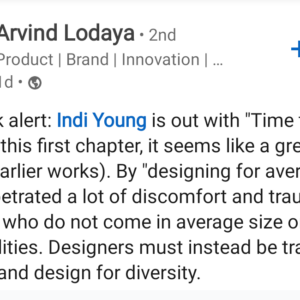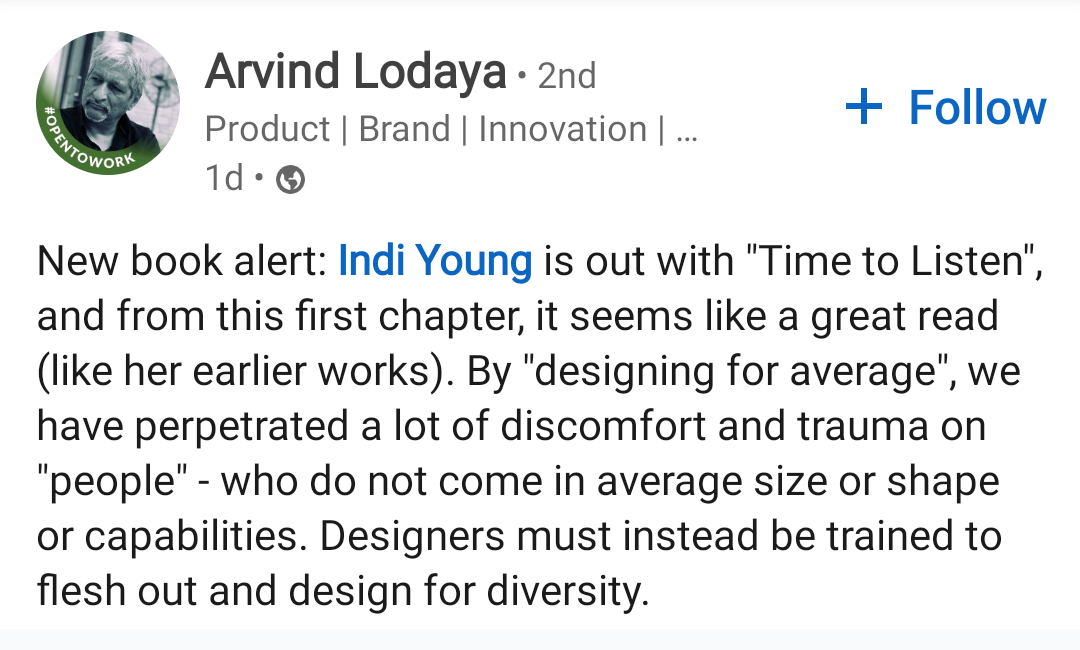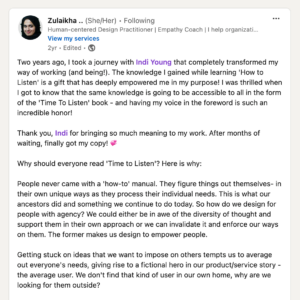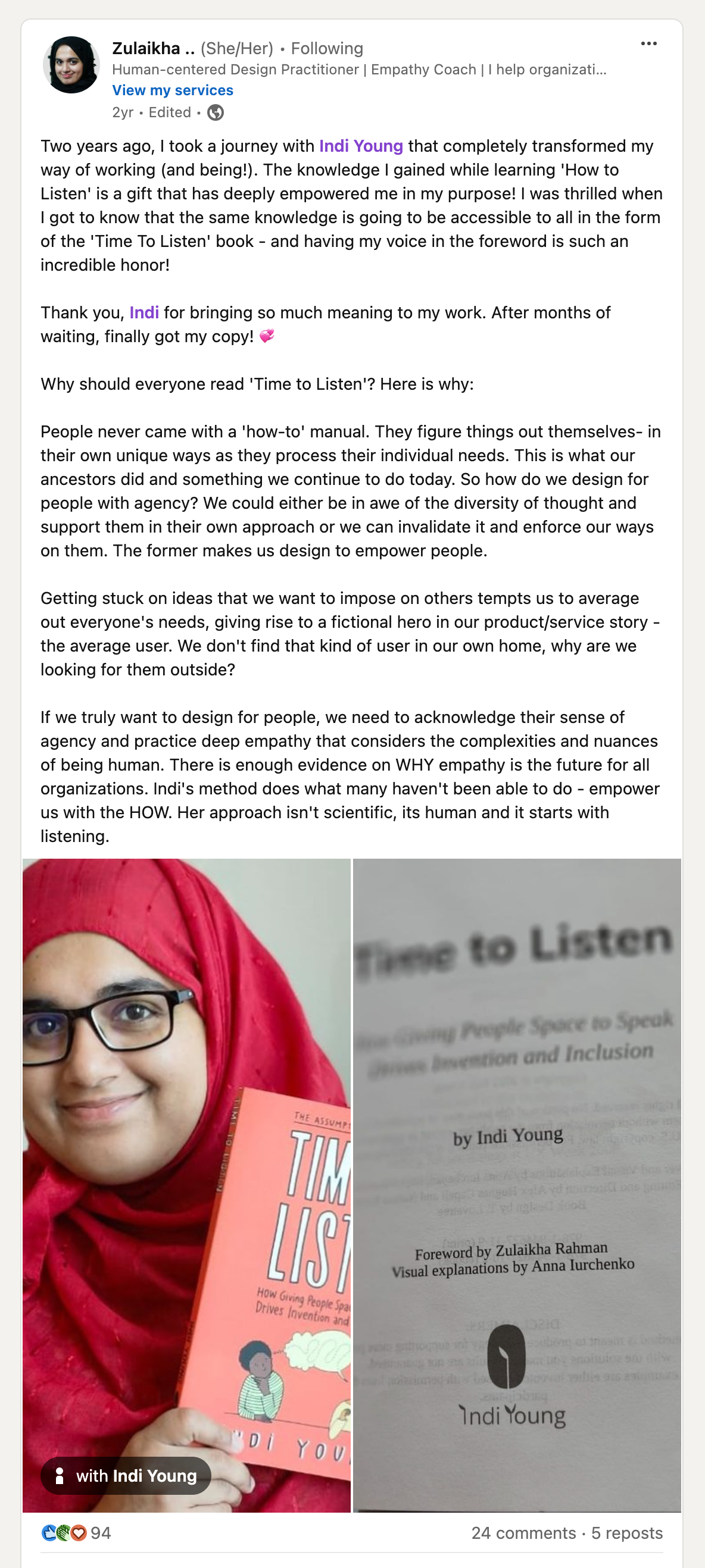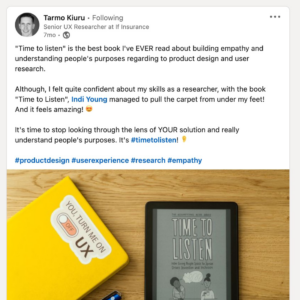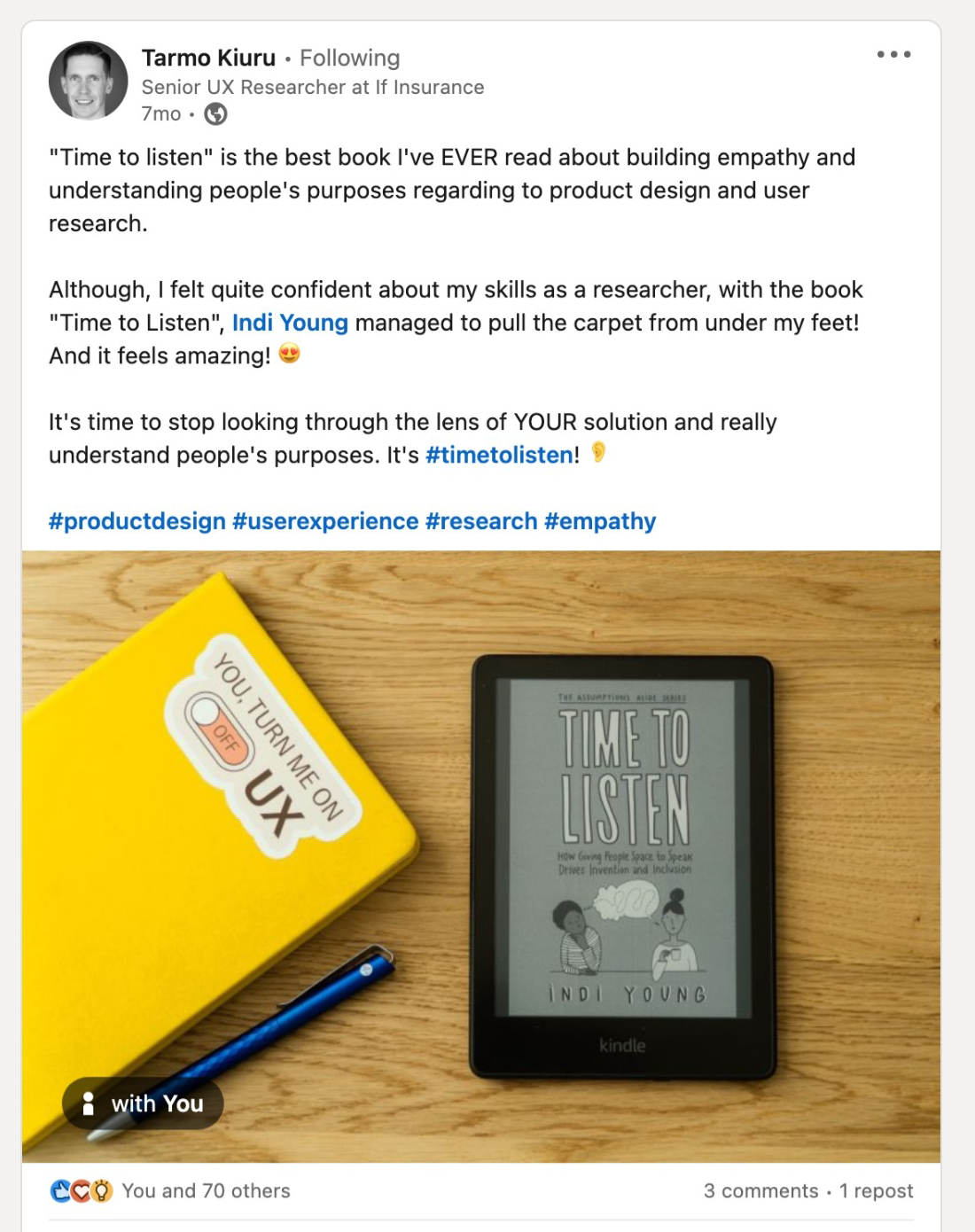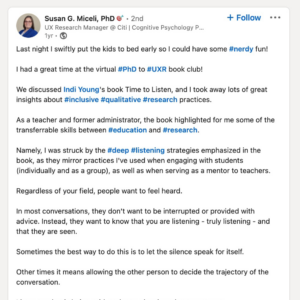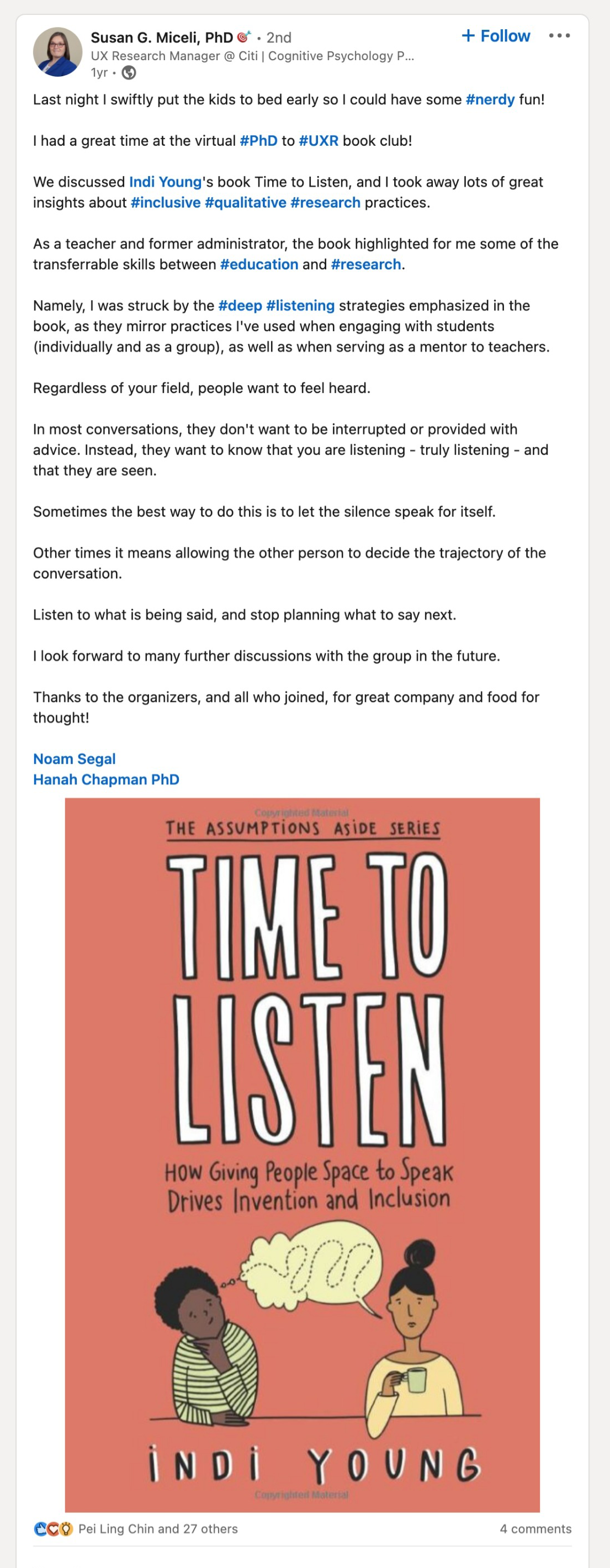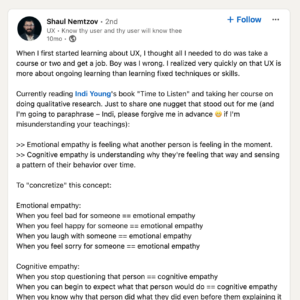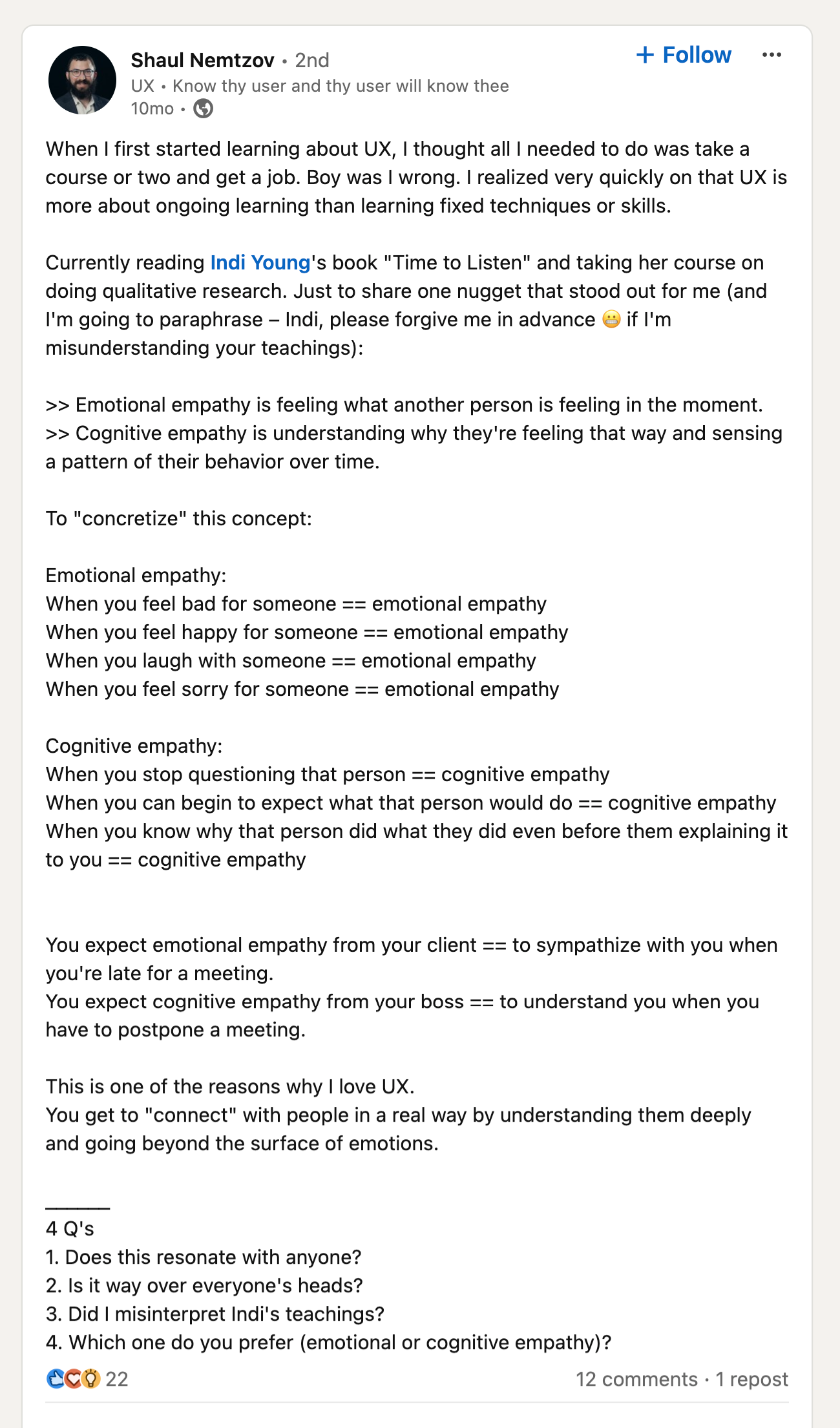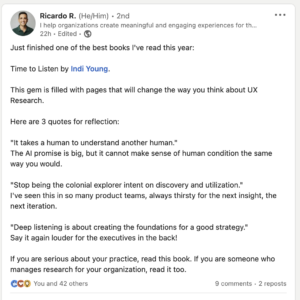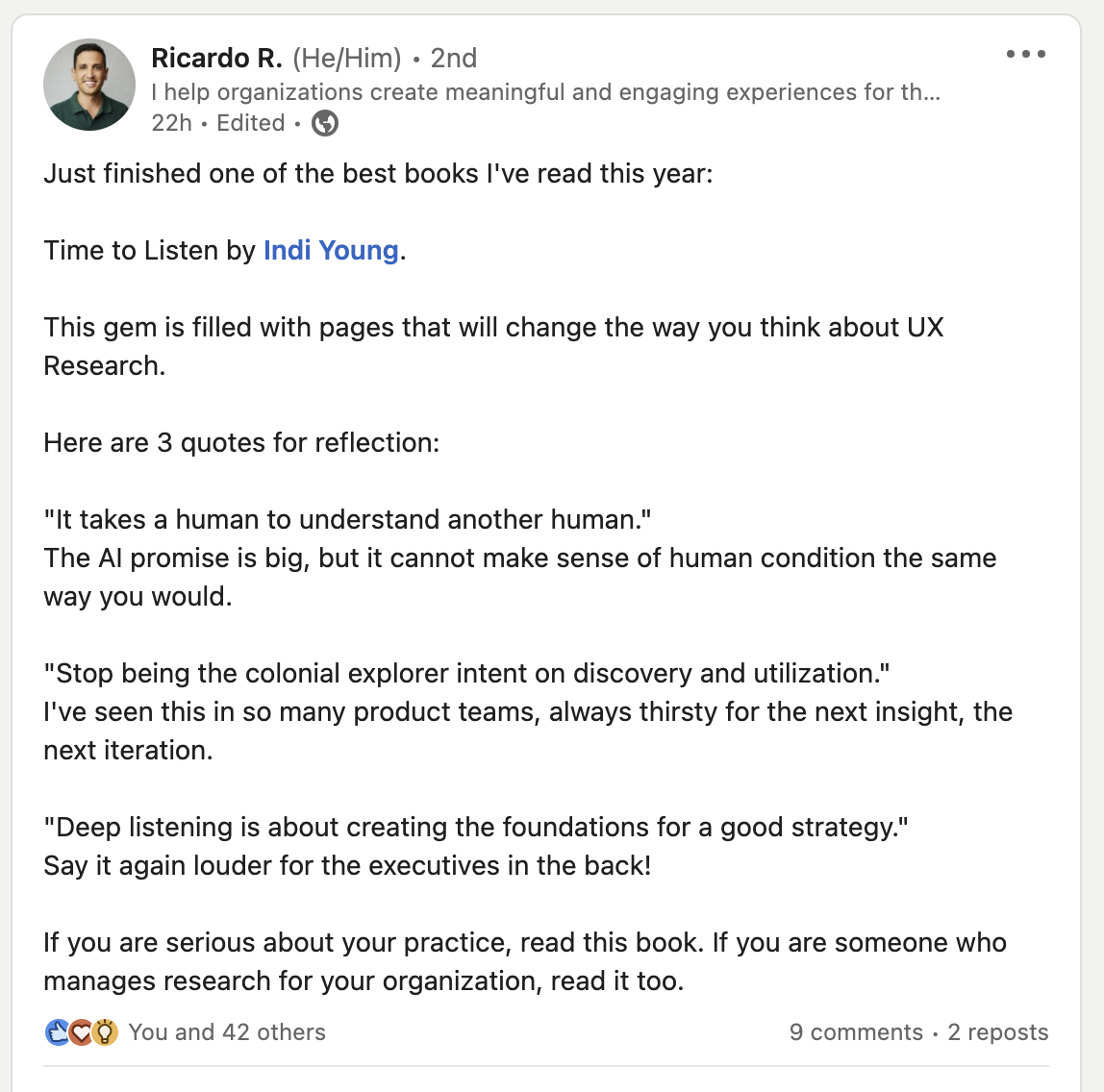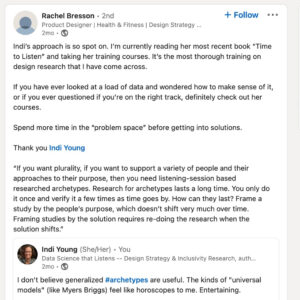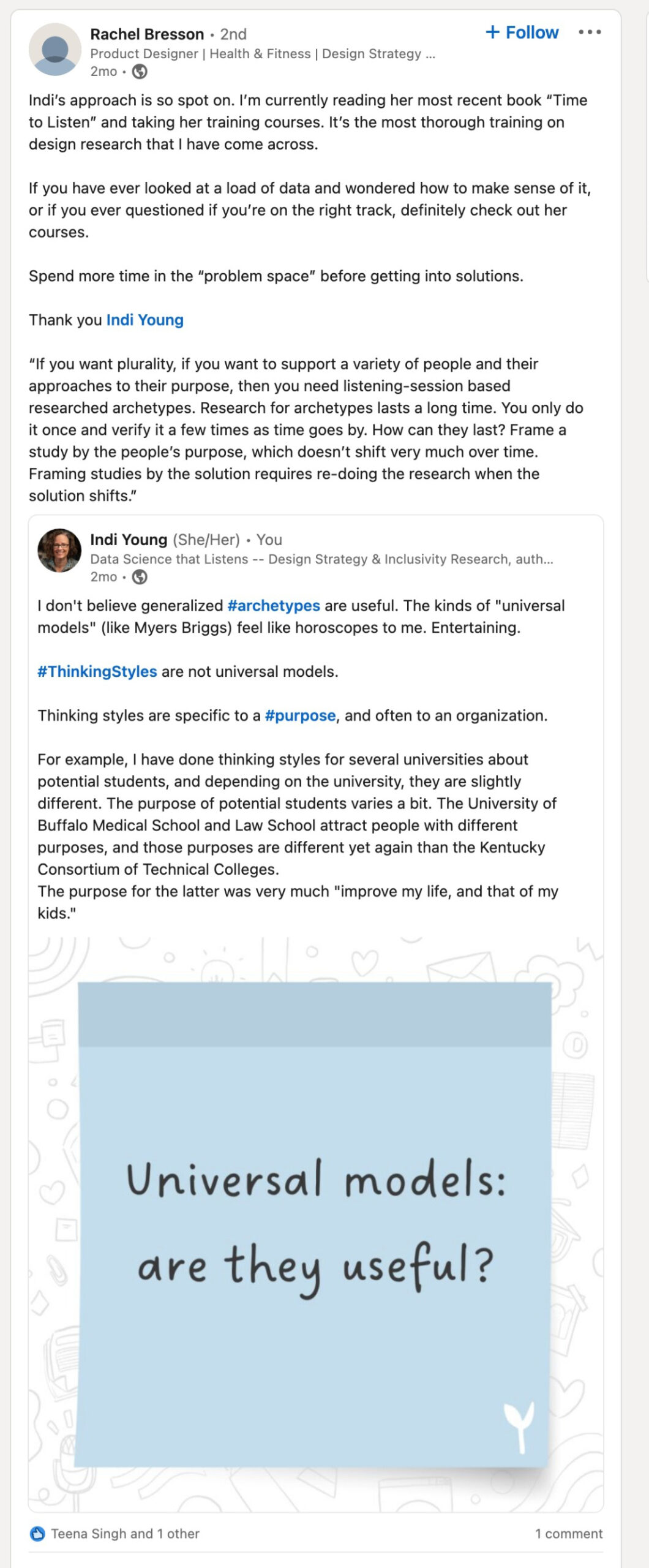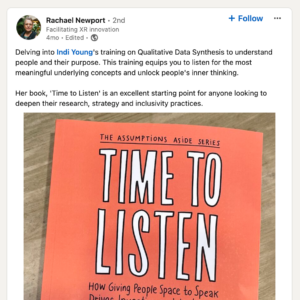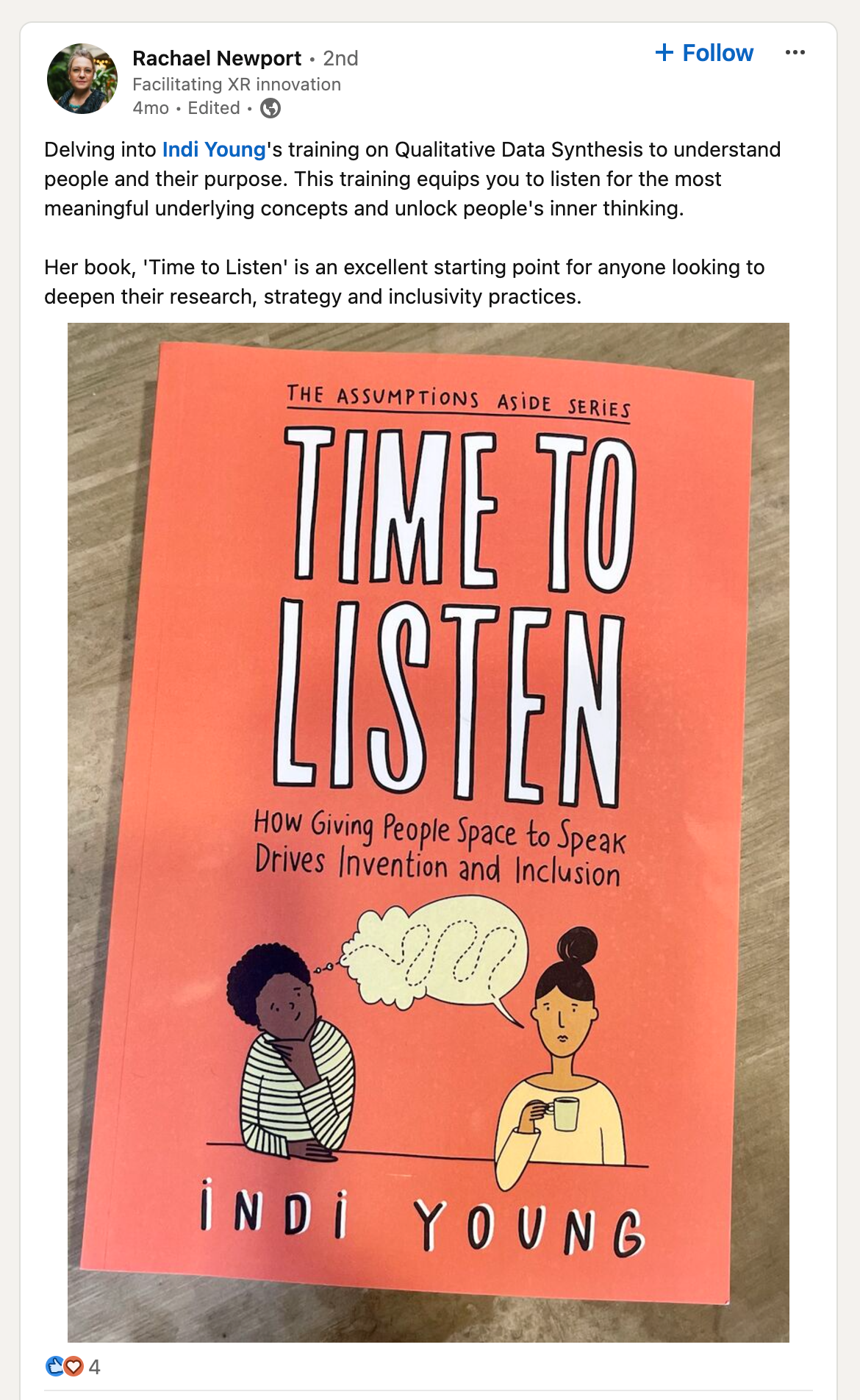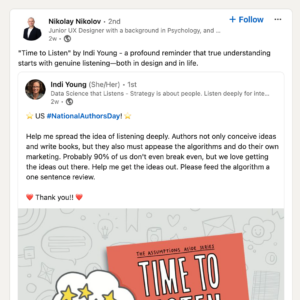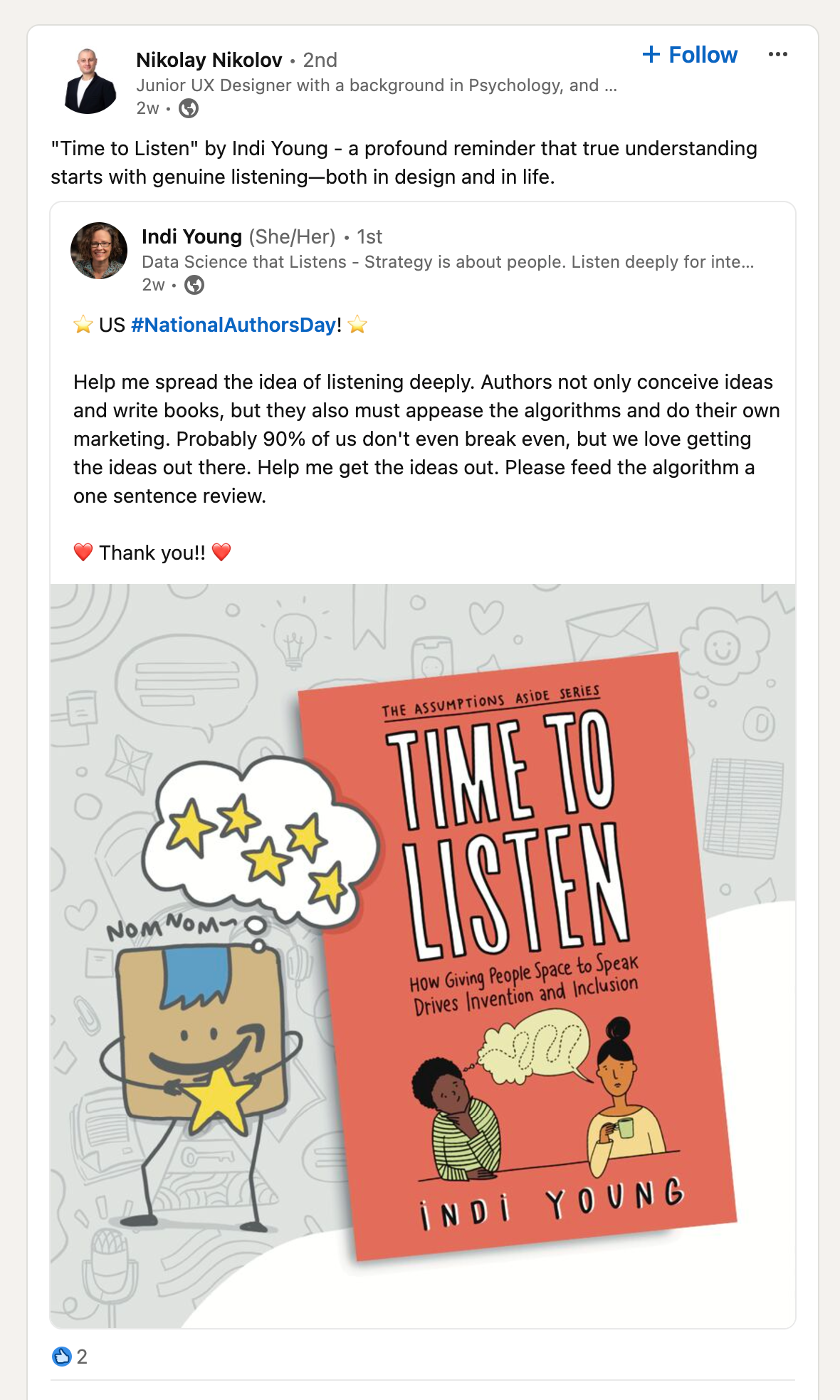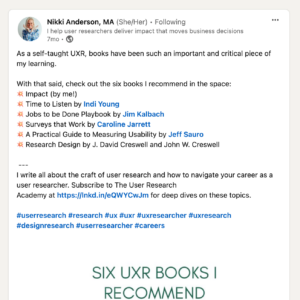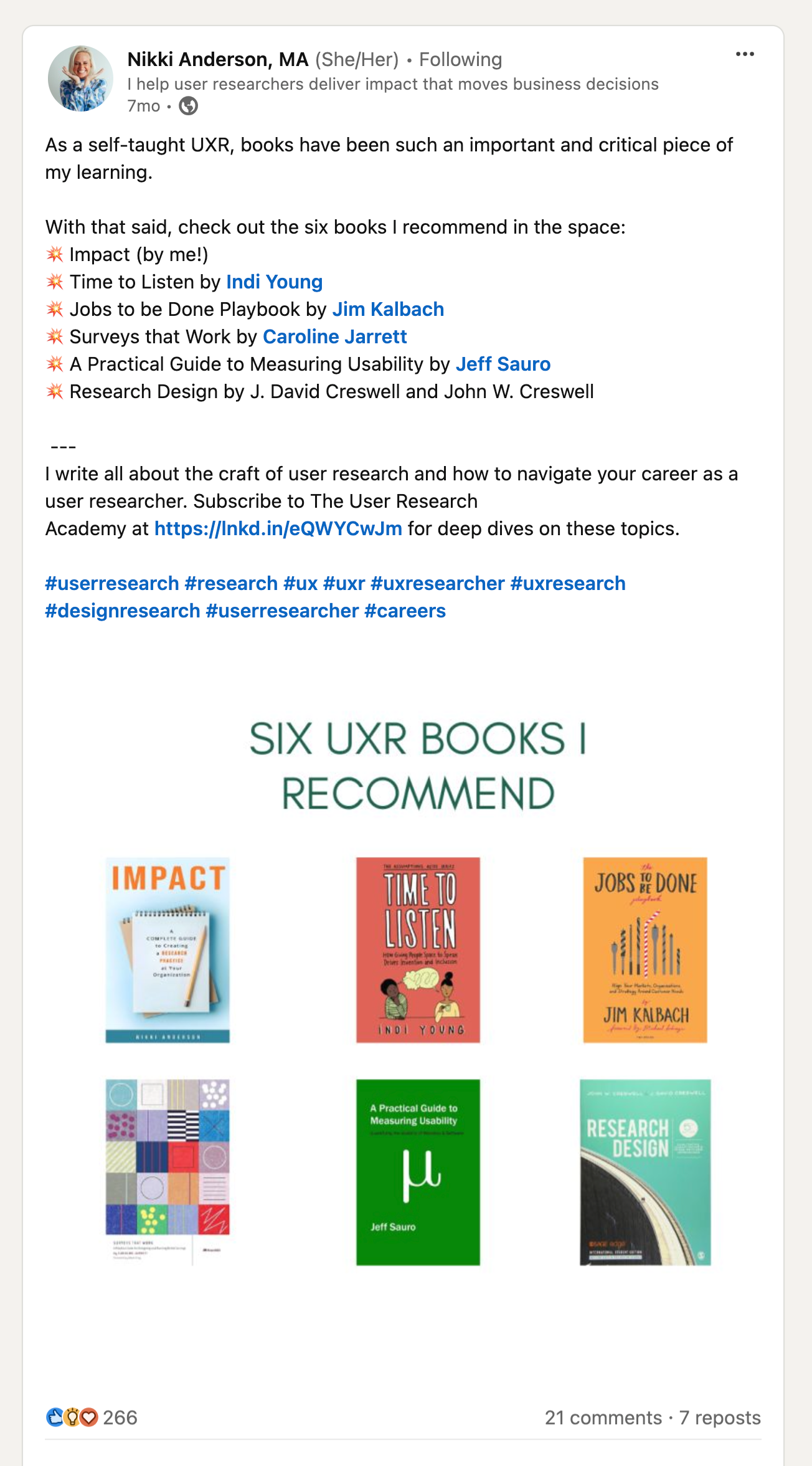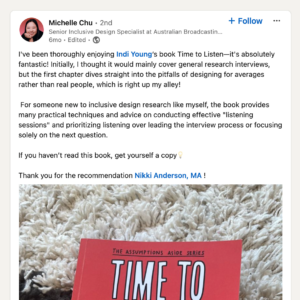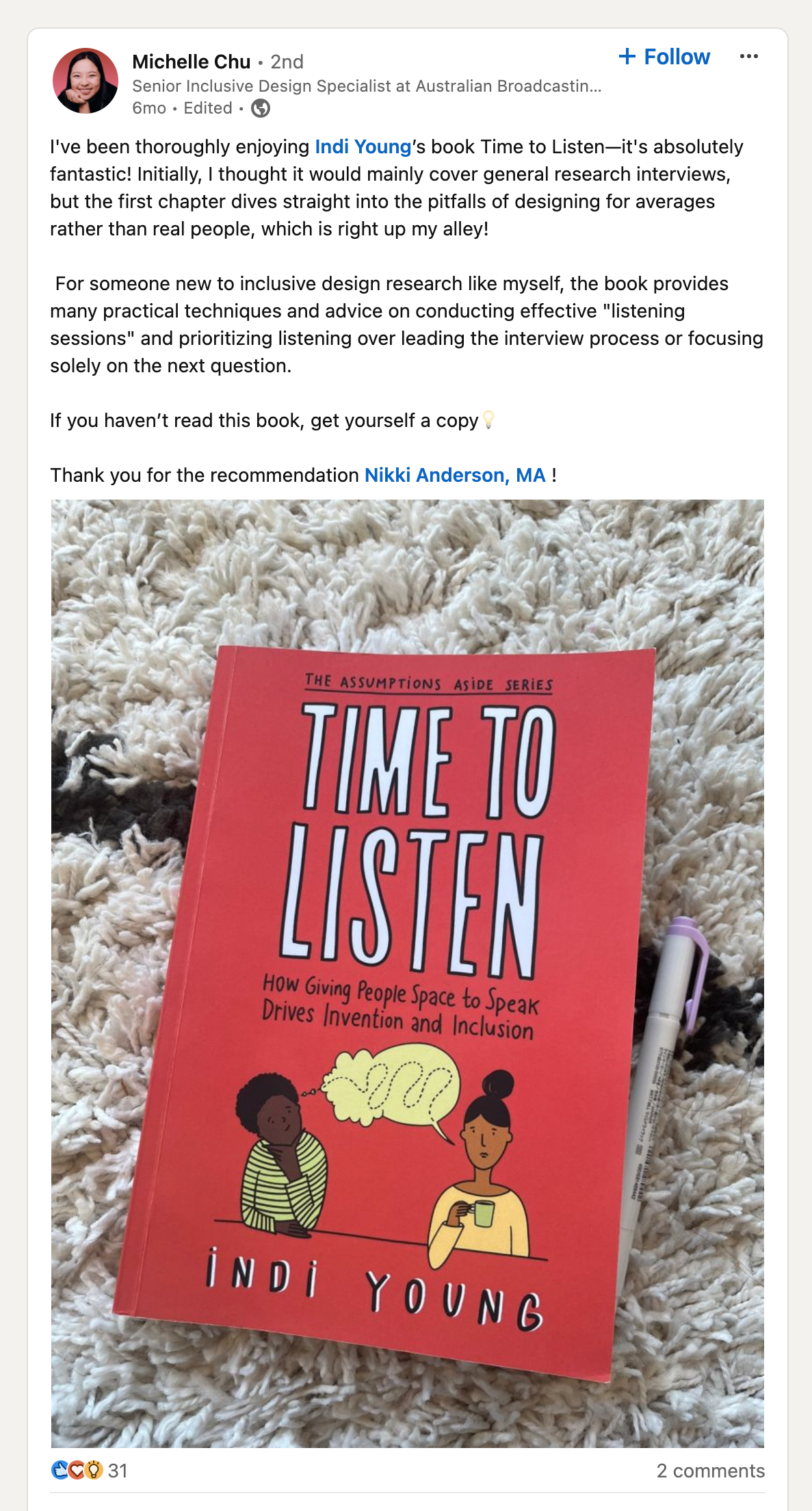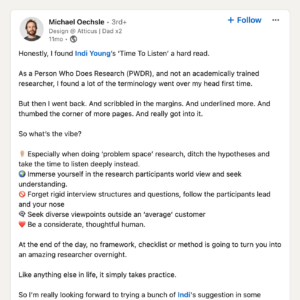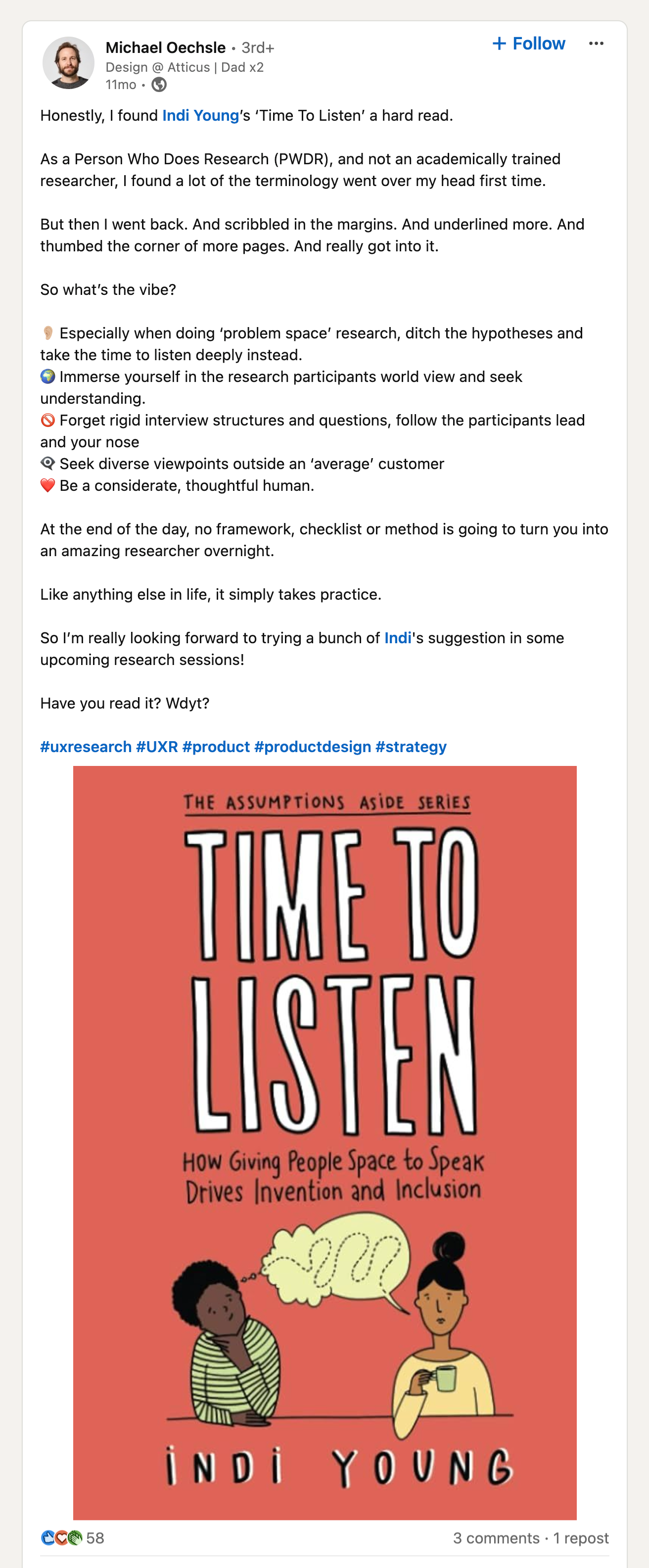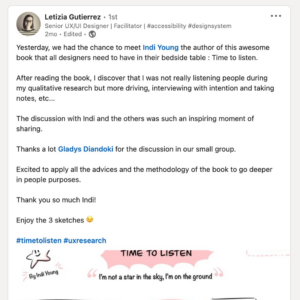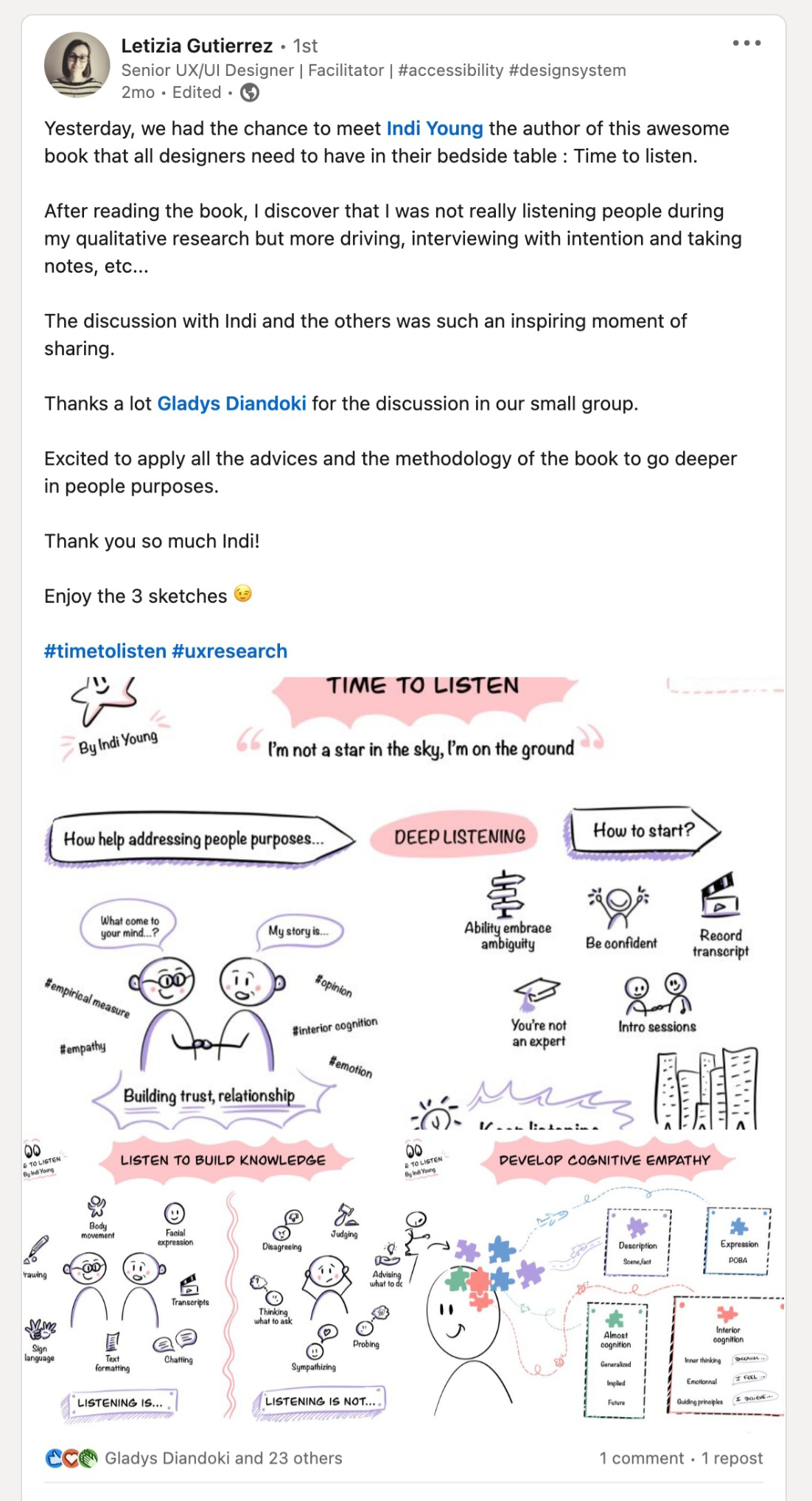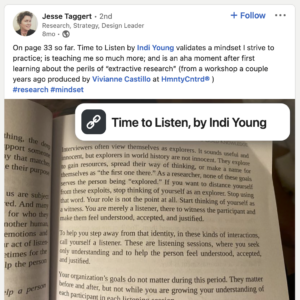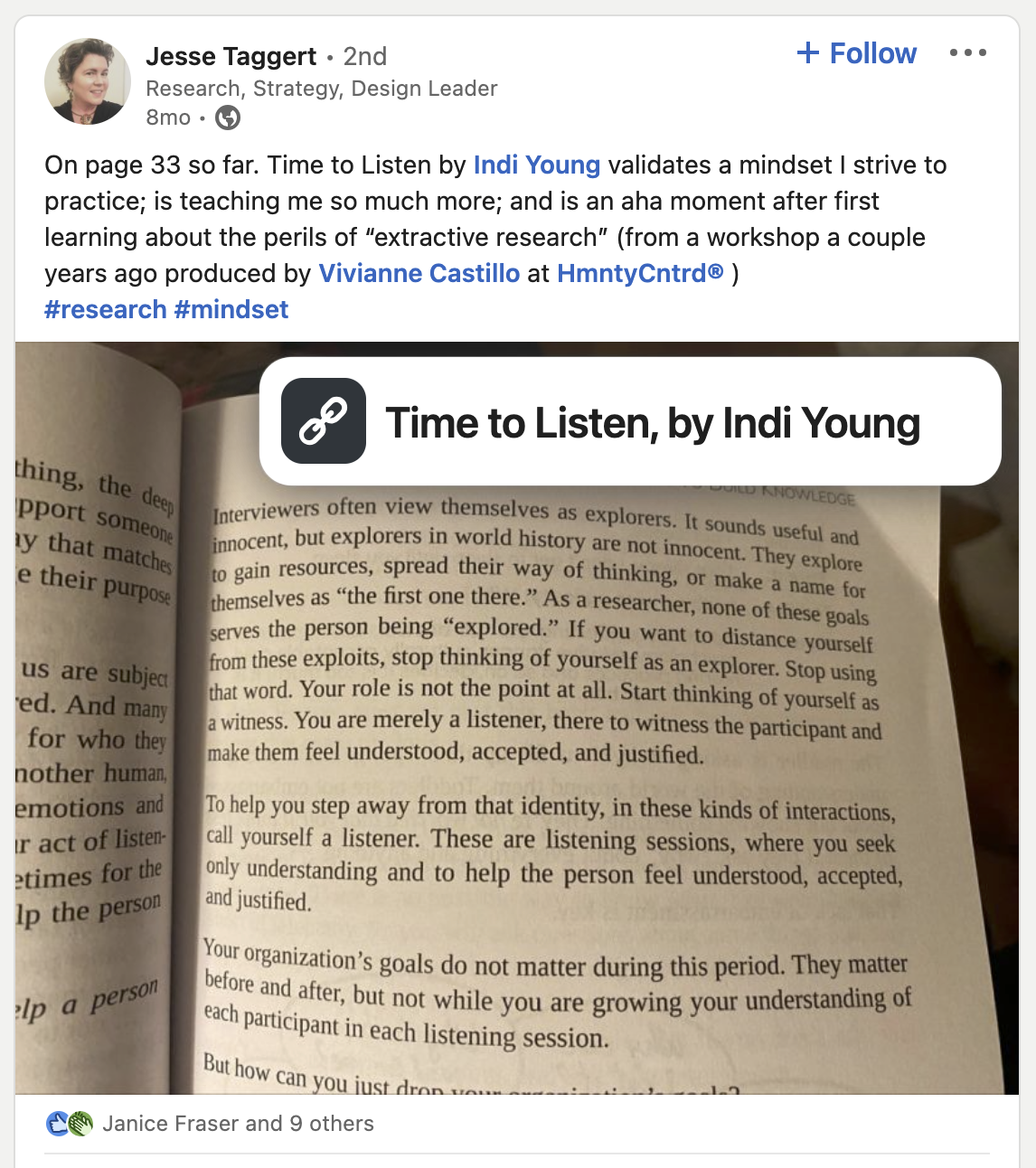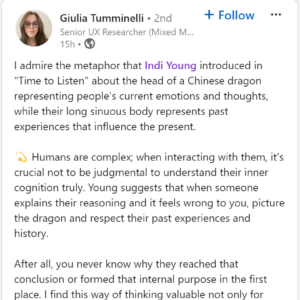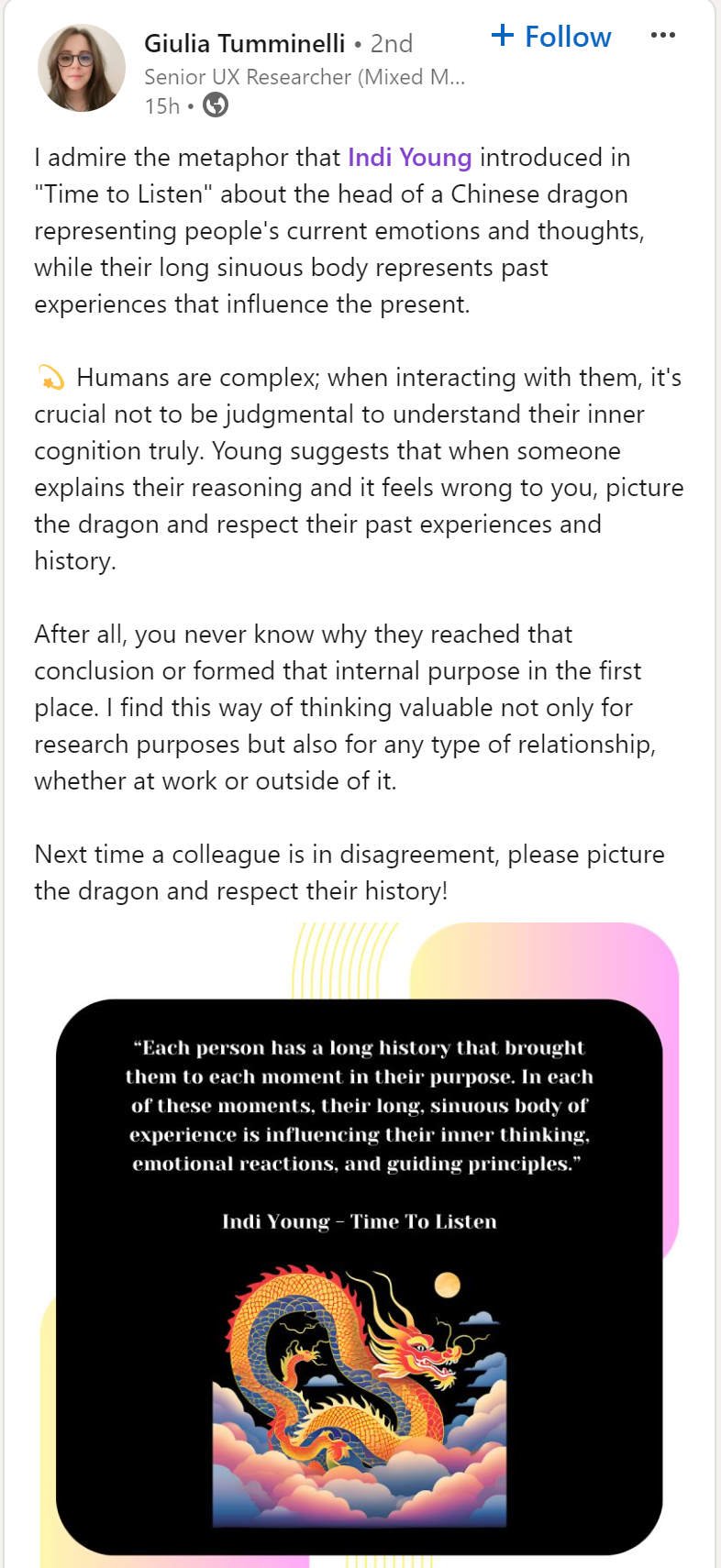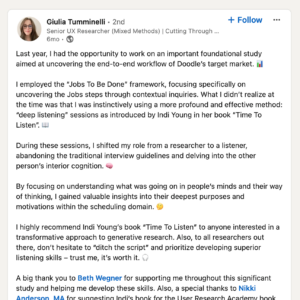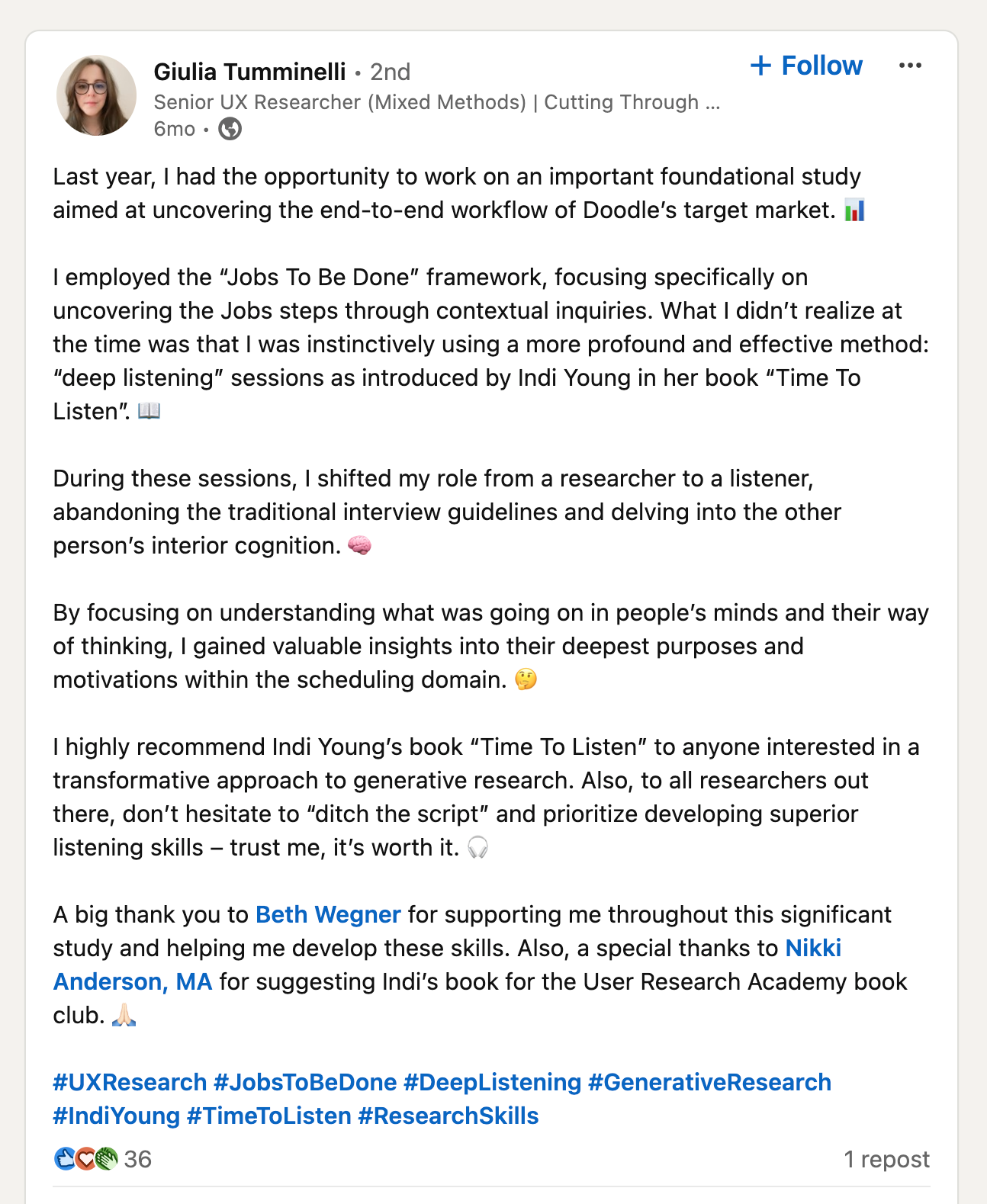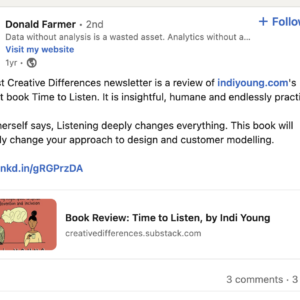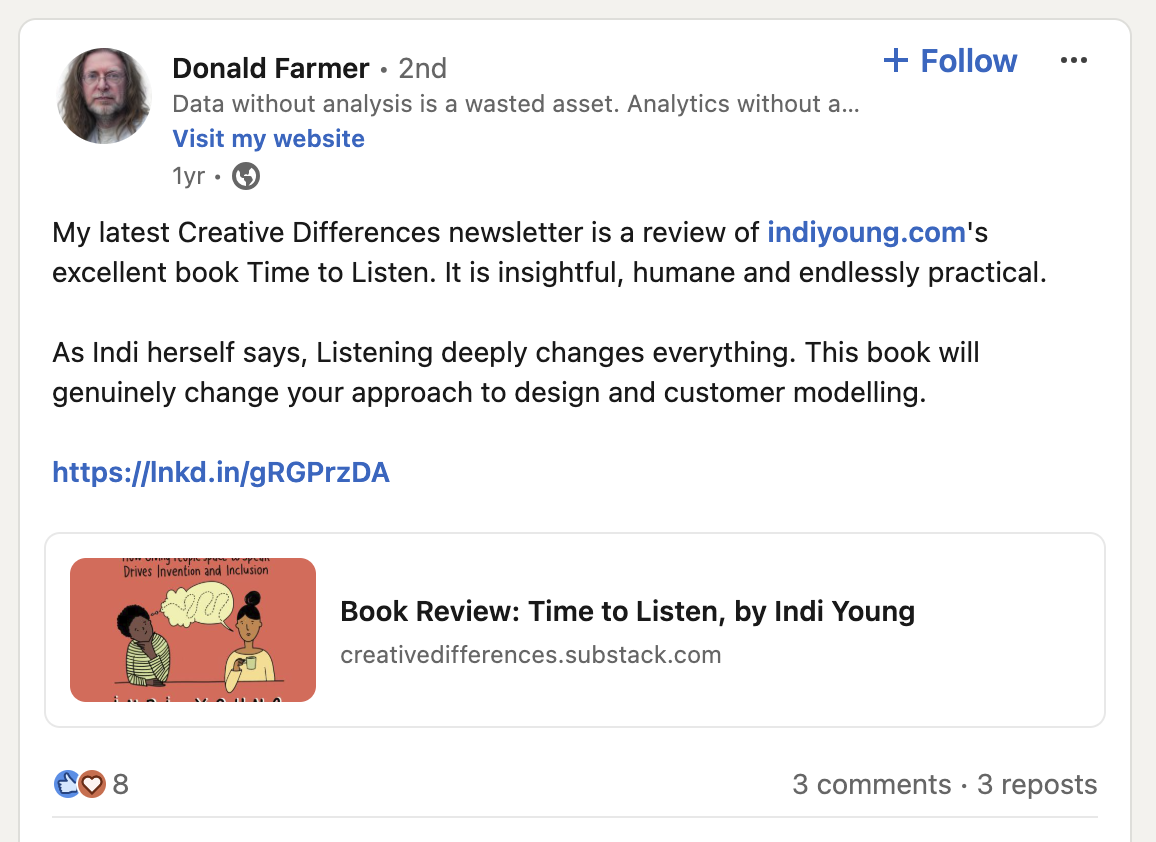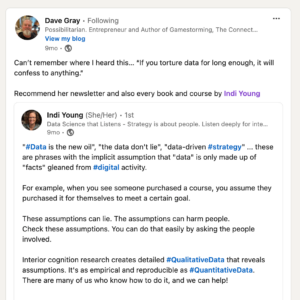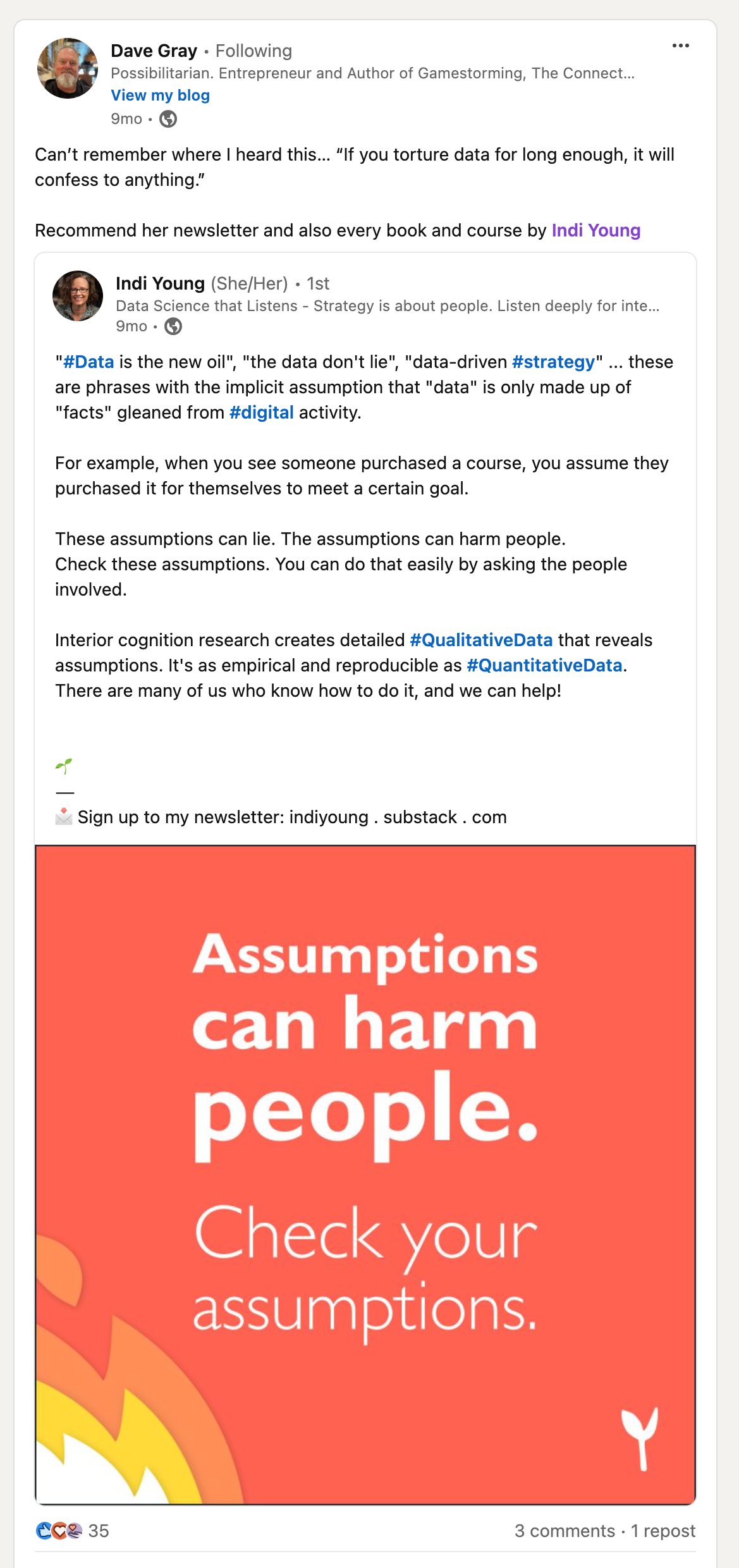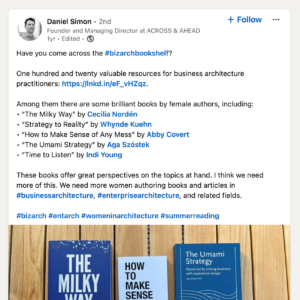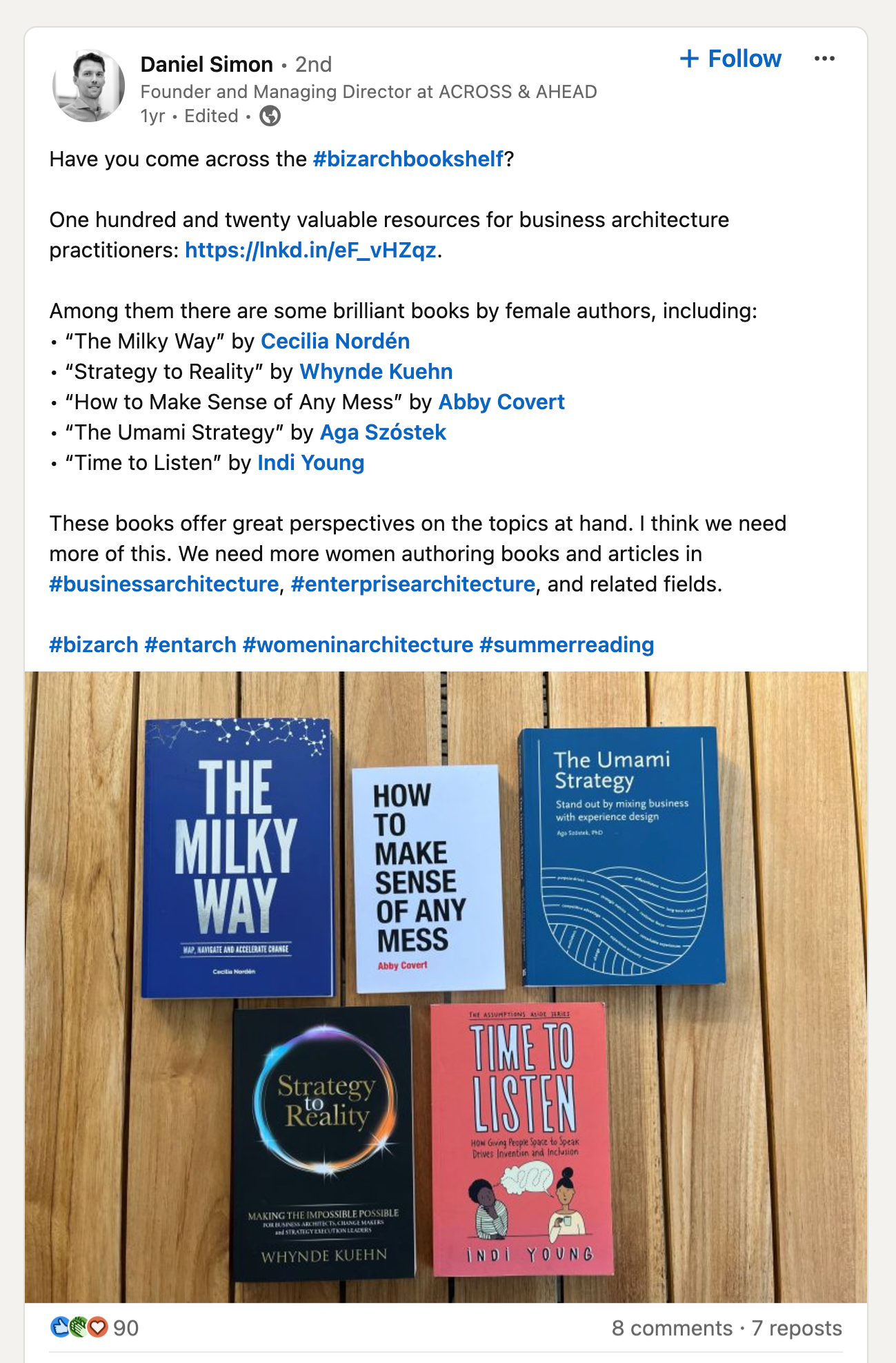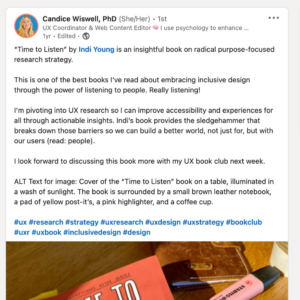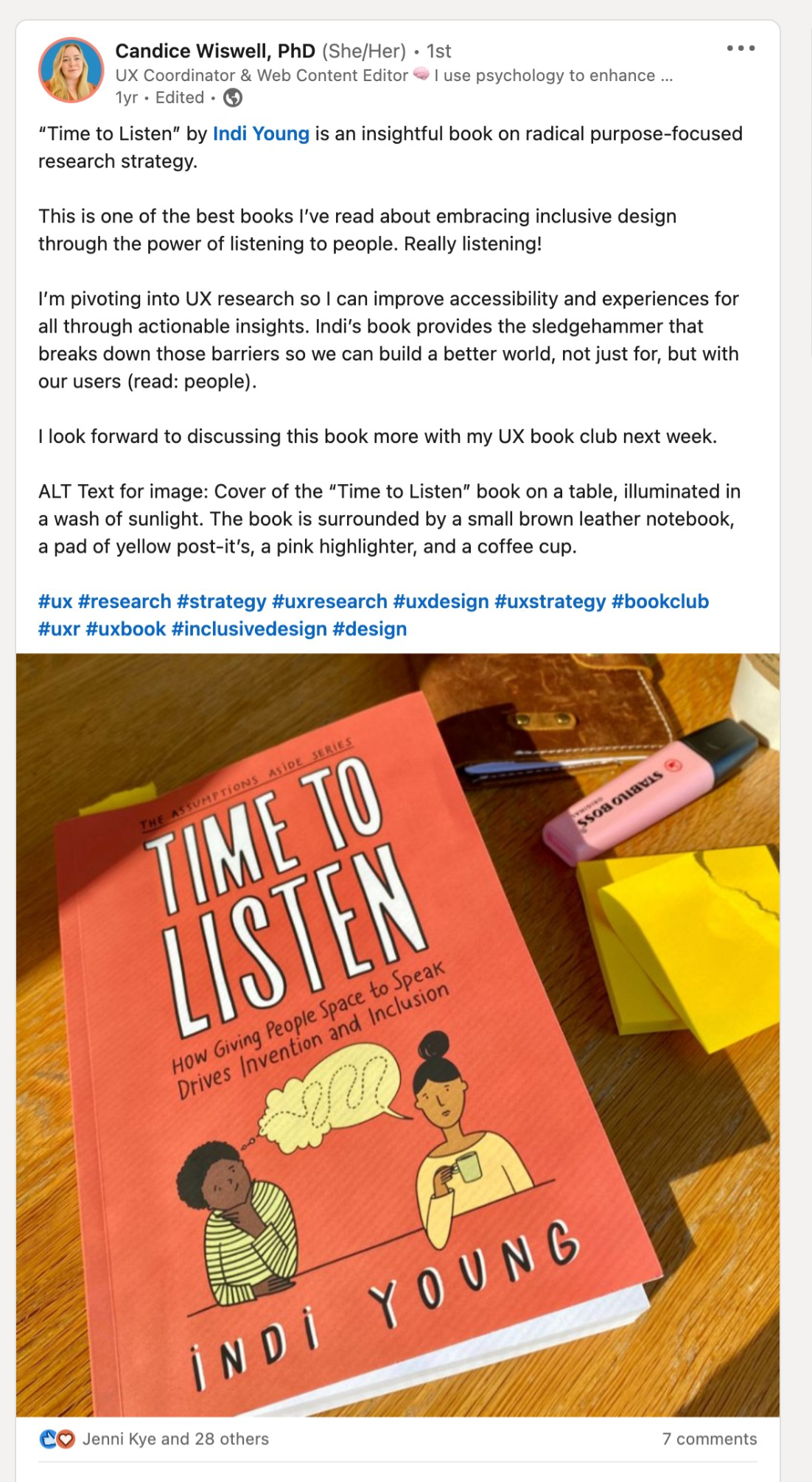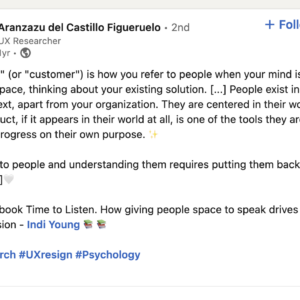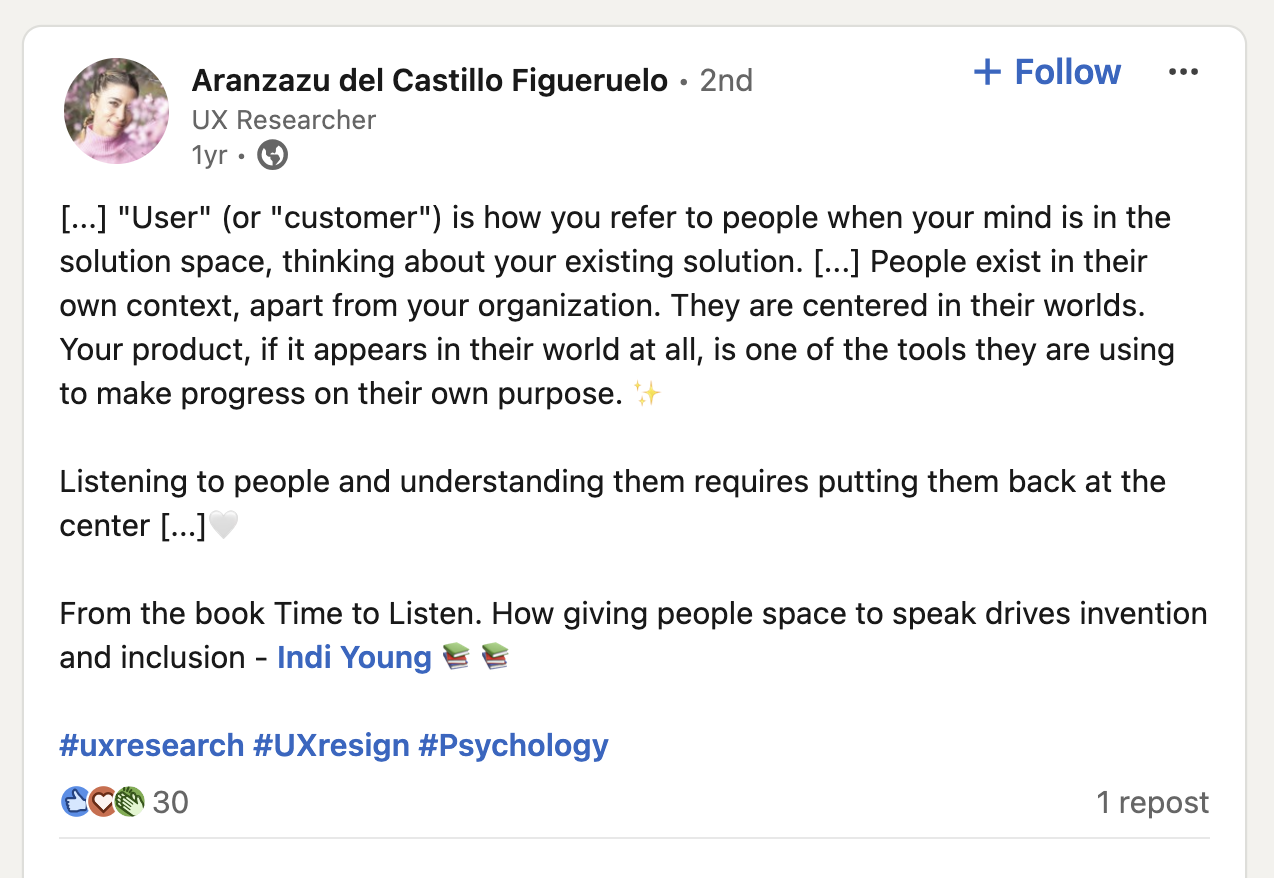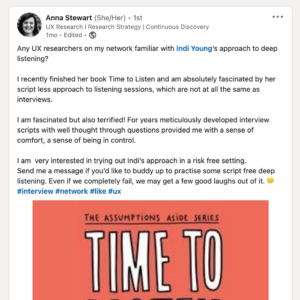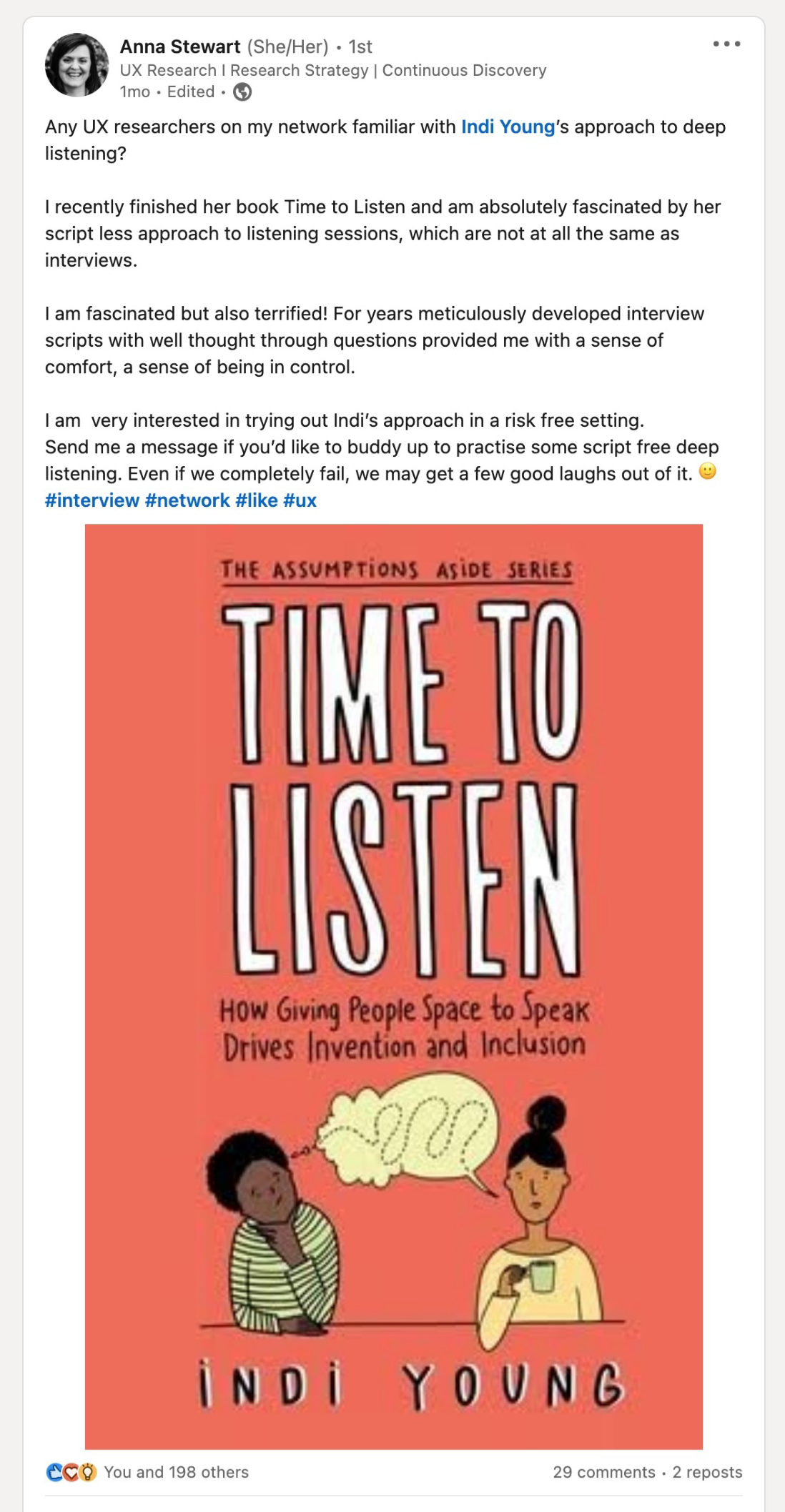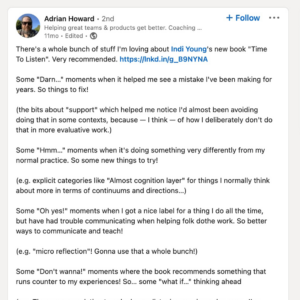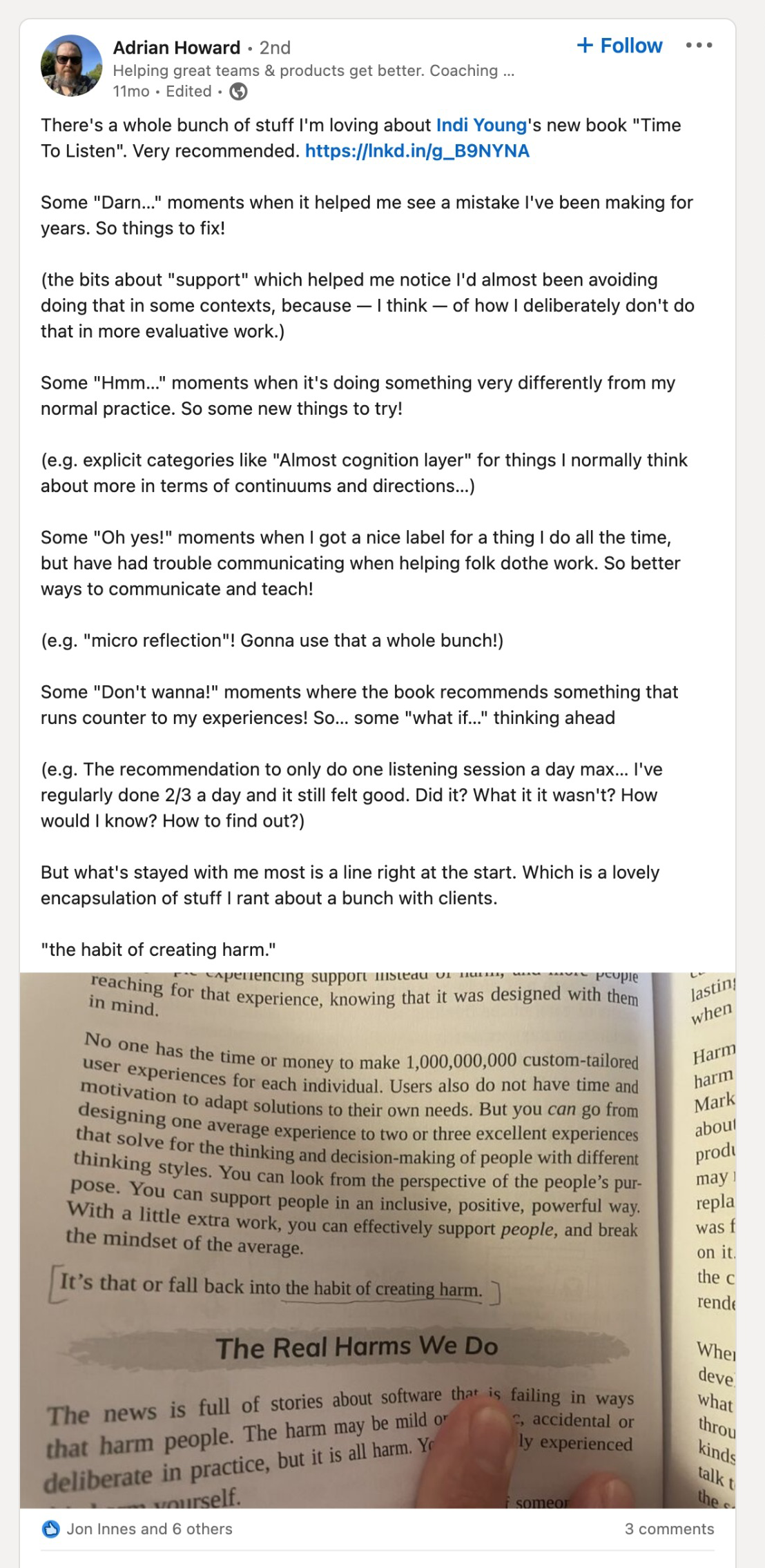Testimonials
Indi’s Courses
I have really learned so much from Indi’s courses. While I knew I would gain knowledge that would help me understand my clients and their true needs, I had no idea how much her process has helped me in life (especially the listening course).
— Cindy Lowrey, 1-Feb-2020
I absolutely loved the course and especially live sessions. It is a life changing experience. I’m going to recommend people who work for me take your class and working sessions. I believe this would contribute to their professional development and shape their view of the world in profound ways.
— Alla Seleznova, 9-May-2024
What started for me as a way to extend my research tools turned out to be a total life-turning experience that helped me both be a better researcher and a better person who understands humans around me more profoundly.
— Maria Mishchenko, 1-Jul-2020
Inclusive and accessible: The courses are designed so that a huge variety of profiles and situations can have access, trying to avoid bias. It is designed for different types of learning, poor vision or ear impairment, non-native English speakers, variable economic contexts and different time zones.
How?
• …— AnaMaría PardoPachón, 15-Jan-2025
Read more
I’ve taken short online courses from renowned brands or international universities, but Indi’s course series has been the single most useful series I’ve ever taken, never mind if it didn’t have some sort of global accreditation. She takes a lot of time, energy and effort to make it useful, practical…
— PL, 5-Apr-2021
Read moreIt is coherent between what it says it offers and how it is delivered. You will finally understand how to collect good raw material, how to analyze it in a rigorous and systemic way, and understand why there are no shortcuts to get down to business.
Hands-on and (real) knowledge transfer:…— AnaMaría PardoPachón, 20-Jan-2025
Read more
Books
Time to Listen
I’ve just bought the Kindle version of “Time to Listen” and can’t believe how much value I can get from it. It’s like a treasure I found. It is changing me.
— David Szabo, 24-Apr-2024
These techniques feel like a ‘best kept secret’ — all product managers should read this to ensure they’re solving the right problem.
— Eliana Ghantous, 29-Apr-2024
Practical Empathy
Customer Experience is now a key competitive differentiator; however, to truly stand out, organizations need to have and apply empathy for their customers.
This wonderfully insightful book teaches us why empathy is important, how to gain it, and how to apply it within our businesses.— Richard Dalton,
Understanding the ‘story of why’ is exactly the strategy we use to align our product roadmaps. Indi’s guide is clear and helpful, and shows how to develop empathy for users.
— Eric Fain,
Practical Empathy will convince designers and product managers how and why empathy is a key ingredient to both product innovation and organizational success.
— Sam Ladner,
As a designer, manager, husband, and parent, a lot of people will tell you that you should listen more, but few are able to show you how it’s done. Practical Empathy analyzes in great detail what kind of mindset leads to serious listening. If you do a lot of interviews,…
— Oliver Reichenstein,
Read more
Practical Empathy is a straightforward guide to extracting greater ROI from the squishiness of empathy.
— Harry Max,
Your product design should be informed by a deep understanding of user goals. In Practical Empathy, Indi outlines a way of working that goes beyond data-driven research methods to deliver genuine empathy for the people who use the things we make.
— Karen McGrane,
Mental Models
Indi Young’s new book is a welcome addition, covering an aspect of the design process that is extremely important but often neglected. The book is chock-full of practical advice derived from real-world development projects, but doesn’t lose sight of the broad conceptual underpinnings.
— Ray Valdes,
Mental models reveal all those things that should be obvious during the design process, but so often come back to haunt you later. Indi’s book provides a systematic and invaluable means for applying mental models; having used her method on many large projects, I’m a true believer.
— Camille Sobalvarro,
Mental Models offers a practical set of techniques for task analysis in the early stage of design thinking and strategic design planning. Developed over the course of more than ten years, Indi Young’s common sense approach focuses on user behavior, diagrammatic representations, and the participation of all stakeholders in collaborative…
— Richard Buchanan,
Read more
At Dow Corning, Mental Models offer understanding at many levels—from a high level overview of customers’ generic unmet needs, to providing a detailed examination of the atomic tasks that they carry out as part of their jobs. So too for this indispensable book—it offers both a high level overview of…
— Simon Parker,
Read more
Services
Having everyone receive consistent training and expert coaching has been immensely helpful. It motivated folks because it was special to get some individualized coaching–job perk.
— Becky Reed, Aug-2012
I went to Indi for coaching on how to explain to my boss how problem space research can help in a large enterprise organization. We’re constantly in sprints and can’t do deep problem space research.
Indi helped me adapt our sprints and show my internal clients that underlying thinking, emotions, and guiding principles are what matter most in enduring research. These internal clients are surprised and happy with the results.— Steve Grieshaber, 1-Dec-2019
One of the hardest parts of research is selling how important it is. Indi’s emphasis on collaboration rather than persuasion helped us convey how the research would help them achieve their goals.
Indi takes the time to hear everyone out on my qualitative research team, clears up confusion, and makes a clear explanation of next steps.— Steve Grieshaber, 30-Apr-2019
I engaged Indi to review the scoping of my first problem space research project. She quickly understood the nuances and provided targeted recommendations to focus the study. Indi’s approach was thorough, supportive and personable.
Indi’s expert advice helped me feel confident. Tapping into Indi’s depth of experience on all things research and design strategy is always so insightful. It continues to shape my research practices today.
Thank you for guiding my team and I to deliver a…— Tafida Negm, 1-Feb-2020
Read more
What I loved about coaching with Indi was that she had the uncanny ability to pack insights into every minute of our coaching. Each session gave me an endless supply of things to work towards.
— Taylor Garland, 1-Jun-2019
Indi is great at reminding me what’s important and how to work from the bottom up to synthesize problem space patterns instead of using my biases to fit things into categories from the top down.
— Steve Grieshaber, 1-Aug-2020
Listening Deeply
I already had read the books and some articles, so watching these sessions motivated me to practice and see what I can get done with the listening sessions.
— Renato Caliari, 21-Jun-2018
After your deep listening training you’ll be equipped with a set of techniques that you can practice while talking to people. It takes time for them to internalize, as indi herself mentions. She still practices.
You’ll learn really deep foundational kind of research techniques and even get to practice them via the exercises Indi gives. But don’t expect that you’ll magically be able to apply them at your fast-paced workplace. It will take time.— Raghav Agrawal, 2-Nov-2018
Great course for learning how to connect at a deeper level with a person before conducting a formal user interview.
— Susan B, 26-Aug-2019
The courses have a lot of information and provide good value for the time commitment.
— David Bixby, 5-Sep-2019
Just do it! It is awesome! The content is academic and practical at the same time, and it pushed me out from my comfort zone.
— Amyris Fernandez, 20-Nov-2020
Indi’s listening session approach is a great learning opportunity if you are already practicing user research and want to refine your skills and expand your perspective on research.
— Raffaella Roviglioni, 27-May-2021
Listening deeply allows you the time to dive deep into another’s inner thinking with them — to understand their reactions and reasoning. Here is where you find the ‘why’ of decision-making.
Listening deeply feels like dancing or snow skiing with someone who’s leading the way. It’s so fun to follow and a privilege to reach this level of thinking.— Gerry Wunsch, 21-Apr-2022
This course was truly impactful for me. It completely transformed my approach to user research and product development. If you’re looking to deepen your skills in this area, I highly recommend checking it out.
— Eliana Ghantous, 29-May-2024
At the end of each listening session, participants tell me how comfortable they felt while chatting with me and how smooth and unscripted it was. One even told me that he loved how I kept referring to what he said earlier (the pull tabs!).
As Indi predicted some participants were willing to stay longer than an hour. The one that touched me the most was the participant who told me that the session helped her gain…— Funmilayo Obasa, 22-Feb-2024
Read moreIts so informative and helpful to work confidently as a UX designer
— Sonali, May-2024
I recommend. At the begining of 1st course I had some douts as it seeemed too sophisticated and philisofical but to the end of the course I feel this is what I always lacked during my researches – assurance I’m not bringing my perspective and biases while analysing.
— Halyna Kovalisko. P. S. Many-many thanks for prices for Ukraininans. I appreciate a lot! I would not be able to affort it otherwise esp as I’m in the maternity leave now., 23-Jun-24
Go for it!
— Daiana, 26-Aug-24
I’ll be honest, this approach is both liberating and terrifying at first – as someone who’s been doing some version of in-depth interviewing for a long time, diving in without research questions and an interview guide feels like cliff diving!
But the results are better. The conversations focus on topics that are most important to people, rather than what the researcher thinks might be important. The techniques taught in the course ensure we’re accessing people’s…— Melissa Tullio, Feb-2025
Read more
The course Listening Deeply a great way to learn how listening skills are strong techniques for developing empathy. Indi has written a book about listening sessions, which is great too! I highly recommend both!
I took the Listening Deeply course in hope of improving how things are done at work, and I’m thoroughly surprised how these skills apply to every aspect of my life.
Practicing the lessons taught in the course is hard, but important. It has…— anonymous, 2-Nov-2018
Read moreListening sessions are unlike any other design research that we’re used to. They have more in common with formal ethnography or therapy rather than with user interviews. But that shouldn’t scare you away. This makes them truly worthwhile.
Listening sessions are a very challenging and rewarding approach, whether your purpose is to work through a challenge with a colleague or to deepen your understanding of people your company serves.
There is no better person than Indi to…— Sonja, 14-Nov-2018
Read moreDefinitely do it. It’s excellent to improve your skillset in design and in life.
— Bibiana Nunes, 27-Aug-2019
Prepare to reevaluate how you have been listening to people you want to learn from as you are preparing for – and executing on – creating experiences.
The conventional way of understanding people is good, up to a certain point. But greatness really comes from focusing on purpose and letting the conversation meander, with light guidance, to meaning.
Helping people articulate their values, steering them in a thoughtful and empathic way, is a skill and art that…— Lija Hogan, 16-Nov-2020
Read more1. You don’t need to take the classes in order, but I recommend starting with Listening Deeply. It will help you understand and appreciate everything that comes later.
2. Be prepared to have your preconceptions challenged and your definition of research modified and expanded. But you’ll emerge wanting to do problem space research and deep listening all the time.— Amy Silvers, 23-Nov-2020
Listening deeply expands innovation pipelines with knowledge of how people think beyond your offering. A greenfield for sustainability & inclusion.
Listening deeply enables creating value propositions for a wider range of perspectives and bringing teams together in understanding others.— Augusto Bianchi, 21-Apr-2022
Deep listening flips the traditional interview structure by allowing the participant to lead the conversation. No longer are we placing them on the spot to answer our questions, but allowing them to speak on experiences pertinent to them.
— Hanan Abdisubhan, 21-Apr-2022
Take it!!! It’s super valuable, and this is clearly the future of problem space research.
— Savina Hawkins, 5-Dec-2023
If you have to choose one course as a UX Researcher, then this is it. This is the only course that truly puts people at the centre of UX Research and teaches you how to analyse people’s inner experience, in relation to your product, and provide long term data for your product strategy.
— Bertus Kock, 6-Mar-2024
This is next level UX Research. As a user researcher you should take this course not only to reflect on your own techniques and to train yourself in really listening. Above that it will help you to see the potential for yourself to support a systemic change in the way products & services are developed.
— Salome Keller, 1-Jun-24
This is a foundational course that will teach you how to attune and listen to others in ways that are meaningful and productive. It will make you a better researcher, colleague, and even friend.
— Andrew Majek, 15-Aug-24
Go for it if you need to learn how to talk to people!
— Bolívar Escobar, 25-Sep-24
There is no other training like this for user researchers that want to learn how to listen, understand, and empathize with people.
Be sure to make enough time to see the recordings. Plan to watch them twice to make sure everything is well understood.
Consider a group discount to get training with other people in the company so you can discuss the sessions and practice listening homework together.— Maria P. Arrilucea, 2-Nov-2018
Everyone in Design should sign up – writers, editors, researchers, designers, design leads – because we can all learn from listening deeper! So often we’re loaded with our own assumptions in all the conversations we come to.
This course has helped me to be more aware of my own judgements, assumptions, and helped allow me to filter in my mind, what I should say (or not say) before speaking so that I can be a better,…— Pei Ling Chin, 26-Aug-2019
Read moreA Listening session is more than a research method, it is a practice that make you notice how people speak and how you listen them, which helps you connect better with other humans in every scenario.
— Raul, 28-Aug-2019
Listening to another person, really just listening, hearing how they think, deeper than the usual opinions, where significance and stories show up (origins of ideas and paths, turningpoints…) is something you have to experience.
No one taught us how to do this. If you’re doing research, you have to take this class, and from Indi.— Alex, 19-Nov-2020
It’s important and beyond what most people in this industry do when they do research. It’s an actual methodology to practice and improve upon. It’s not just stenography.
— Steve Grieshaber, 23-Nov-2020
A listening session is an open conversation that explores the inner thinking of a persons lived experience to reveal their inner cognition and purpose, offering the ability to fully explore and understand a problem space.
— Domoni Mainstone, 21-Apr-2022
Through this course I learned to listen and distinguish peoples opinions from what they really think and feel. Got plenty of opportunities to practice building questions and safe space that helps to explore core of what person thinks and feels.
— Alicja Marcinek, 13-May-2024
TAKE IT. Take it now. Because you’re probably doing this wrong, and you’ll be thankful to know how to do it better.
— Joan Vermette, 14-Dec-2023
Thank you for the incredibly thoughtful and intentional energy and expertise you put into this course.
— Sydney C., 29-Mar-2024
If you have a sound understanding about how to conduct one-on-one interviews, this will take your skills to the next level: it’s the next step in your journey.
(Yes, I know this course isn’t about “interviewing” but I think this is how many recognize this research method.)— Chris McGee, 19-Jun-24
Go for it, this is a very empowering course I feel like every human-centered practitioner should definitely do
— Gao, 24-Aug-24
It’s very interesting and challange! Makes you think every time you are talking to someone…but it’s not an easy methods and requires practice
— Joana Baptista, 19-Dec-24
Part 1: Emergent Data Synthesis (Concepts & Summaries)
You will learn how to get a deep understanding of people. This is something that probably nobody else has ever taught you. If you’re truly interested in getting the most out of your research interviews, then this course is a must! What you’ll learn is not only a valuable professional skill but also a life skill.
— Sonja, 14-May-2018
Indi’s training has transformed the way I think about patients and products I design for them. Thank you for sharing this wisdom, knowledge and experience!
— Gosia, 2-Jan-2019
If you read Indi’s books and want more, take this class.
— Francesca Barrientos, 10-Feb-2019
This data synthesis process seems richer compared to others that I have used. It is a method where it feels like you are really applying empathy.
— Zulaikha Rahman, 1-Mar-2021
Do it now, but spare some time for homework!
— anonymous, 5-Mar-2021
It’s a great way to learn a systematic way to summarize the deep concepts in transcripts, and get practice doing so
— Cindy Merrill, 9-Mar-2021
Definitely take this course to learn how to analyze qualitative data. A lot of times, stakeholders think that we have to do site visits to understand our customers. Instead, Indi’s method is about understanding people’s intentions through deep listening and site visits are not necessary.
— Julia Cowing, 20-Mar-2021
This is a rigorous, structured approach to get more value from qualitative research (listening sessions, interviews etc.). The course guides you step-by-step with ample opportunities to put your learning into practice and useful resources to refer back to.
— Phil Bickerdike, 22-Aug-2024
This analysis method is very comprehensive and quite rigorous. It’s a great foundation for research practice.
— Dana Lynn, 6-Feb-2020
The framework you will learn here is invaluable whether or not your end-goal is mental-models. It helps you divide the shapeless mass of an interview into purposefully formatted chunks. These will then enable you to have meaningful discussions about qualitative data. Not only that, you will also learn what makes for a rich and useful listening session.
— Yousef Kazerooni, 14-May-2018
This is a great way to further your skills, whether you are two years into your career or longer. I’m excited to use these new skills in my next applicable project. It was so refreshing to learn something actually useful and new instead of going to a conference where you might find one thing you could maybe use.
Tip: make sure you set about 3 hours aside each week for this (recordings + exercise).— Jordan Smith, 31-Jan-2019
Not only did Indi’s course teach me a new method for coding transcripts, but also showed me how to be an overall better interviewer. I found myself asking better questions, probing deeper, and listening more intently. I left the class a markedly better researcher than when I started.
— Josh Rosenberg, 1-Nov-2019
A structured way of analysing interviews, quite helpful for researchers who have been in the field for some time.
— Sridhar, 3-Mar-2021
Nuanced and refined tools in order to sense the deeper meaning and purpose in research data … inspiring, refreshing and energizing!
— Manuel Dahm, 5-Mar-2021
This particular course is about finding the gems into ore. It’s about keen attention to the words, intonations, emotions, meanings and principles whether obvious or hidden. I look forward to learn how that findings will sum up into patterns and models.
Course series in general is changing personal lens. So you think, see, plan, communicate with your users and stakeholders differently.— Natalia Harzu, 9-Mar-2021
If affinity mapping is primarily how you or your team synthesize data, stop and immediately take this course. Indi breaks down how to mine more evergreen, strategic data from listening sessions with incredibly helpful tips that can only come from decades of practical experience. It’s immediately actionable. As an accounting undergrad with a sociology minor years ago and newer UX professional, this class has helped to backfill gaps in my data synthesis skills. My confidence…
— Kara Snyder, 8-Jan-2023
Read morePart 1: Qualitative Data Synthesis gave me capabilities I had been craving as a self-taught UX Researcher. It showed me how to draw data from a transcript in a reproducible way and how to represent another human’s inner world with care and nuance. The course is one-of-a-kind in its equal focus on rigor and empathy, and I recommend it highly!
— Sarah Caplan, 23-Aug-2024
Part 1: Concepts & Summaries helps you break down people’s thinking into it’s core elements, allowing you to capture the full-depth of what people say. Without a doubt, the skills from this training series improved my ability to turn my research into impactful insights that help organizations step into their audiences’ shoes.
— Eddie Fernandez, 15-May-2018
Very hands-on. You’ll need mental stamina to get the most out of coursework but it’s a valuable learning experience! Don’t expect to sit back and absorb information.
— Hannah, 5-Feb-2019
I’ve taken short online courses from renowned brands and international universities, but Indi’s course has been the single most useful course I’ve ever taken. The most valuable impact: my clients have commented that the research approach is valuable and they have changed the way they do their business because of the research insights shared.
I often learn a lot from the Slack community even after completing the course, and they always have my back whenever I…— Pei Ling Chin, 1-Mar-2021
Read moreThis course will help you understand people’s mindset and decision-making process when they try to accomplish something. You will be able to reduce bias significantly, working towards a much clearer picture from which to make decisions.
— Augusto Bianchi, 4-Mar-2021
Fills in one important missing piece of the puzzle: how to generate reliably valid qual insights from interviews. I have been looking since I started this career.
— Greg Hamilton, 6-Mar-2021
This course provides a structured methodology to guide your research process, focused on capturing the main aspects of what people think and feel in a methodic and efficient way by combing interview transcripts
— Tomás Ottolenghi, 10-Mar-2021
I loved this approach of looking at data. It validated so many parts of how I was approaching it earlier, which was truly great for me.
— Leena Jain, 11-Jul-2024
1) This was very rigorous, more so than Listening Deeply. 2) This provides a sound structure for doing data synthesis if you’re lacking a sophisticated and organized way of doing it, or are just not satisfied with how you are doing it today. 3) Like listening deeply, this course brings your skills to the next level
— Chris McGee, 15-Dec-2024
Part 2: Emergent Data Synthesis (Cultivate Emergent Patterns)
Go for it!! The material is really rich and you are able to directly use all the things you learned from this course
— anonymous, 29-Mar-2019
Great course, the small group means intimate setting in learning. Indi’s experience in both teaching and practicing just shows. If you think you “know it all” or are already good at qualitative research / problem space research, think again. :) Personally feel I have gained alot of wisdom not just professionally but personally as well. A series of courses that you probably can keep coming back to listen. Our minds are a tricky pesky…
— Yan Huang, 10-Feb-2020
Read moreThis course has a different approach to qualitative analysis, much more comprehensive of actual human emotions and thinking patterns. Indi’s content is not the same cliche you usually find around the internet when it comes to teaching UX disciplines, instead, it’s new and very specific, as well as very detailed. It completely changes the way we are used to approach qualitative research.
— Marina Leite, 15-Apr-2021
You will come away with a deep understanding and gut feel for how to apply these methods to your own projects. Plus, the way Indi teaches is delightful and full of the nuance that usually gets scrubbed out of such polished presentation.
— Francesca Barrientos, 11-Oct-2023
Instead of hoping that Agile will randomly lead you to your product value, why don’t you let it emerge from your user sessions through proper emergent pattern analysis? Just take the course.
— Bertus Kock, 27-Oct-2023
It’s the only advanced user research course you can find online. The format is very engaging. You have weekly meetings in a small group where Indi teaches new concepts through hands-on activities. The best part is the weekly course exercises, which reinforces learning and gives you a taste of how to put news skills/knowledge to practice.
— Gosia, 5-Apr-2019
I wish I would have discovered these courses earlier in my career. The care put into the content is evident, and the depth and nuance is unparalleled. I would highly recommend Indi Young’s work, and her video training makes concepts she writes about come alive and easier to grasp.
— Mo Goltz, 19-Feb-2020
It helps you add a layer of analysis to the clustering of learnings from interviews or other listening techniques, focused on avoiding biases
— Tomás Ottolenghi, 16-Apr-2021
It’s worth it, but don’t load your schedule up with too much else during the modules because you have a lot of homework to do between the recorded lectures and the exercises.
— Allison Ault, 12-Oct-2023
Just do it.
— Markus Eklund, 14-Nov-2023
Indi’s course had an immediate impact on my skillset. I left the class a noticeably improved researcher!
— Josh Rosenberg, 1-Feb-2020
Even if you’ve been a ux research practitioner for long, this course will show you how to let data speak for itself and how to group findings without bias.
— Augusto Bianchi, 15-Apr-2021
Feel more confident in your qual skills by learning how do to do bottom up analysis. You will learn to conduct inclusive research (minimize biases), and you will see your shorter, one-time research more clearly.
— Julia Cowing, 18-Apr-2021
You will learn not just to find affinities and cultivate patterns, you’ll also learn to capture the focus of the mental attention of the research participants and you’ll avoid to stain the participant’s quotes with words from your own mind.
— Miguel Baeza, 17-Oct-2023
Thinking Styles of a Purpose
The give-and-take gave me the impression that I was part of something that’s still evolving, which is exciting. Those of us applying problem space research to our work are part of the evolution. Each engaged student becomes part of how this fluid process is taught, and how it may be practiced in the future.
— Cindy Lowrey, 15-May-2019
The training is a great way to expand how you conduct user research. Indi teaches you how to conduct your studies and analyze your data so that you’re getting to the heart of the users’ problems and better understanding their needs. I hadn’t realized how much rich data I’ve been missing about users just by how personas have been created and used.
— anonymous, 28-May-2019
Go for it. It’s all useful and better than the NNG courses I’ve been on.
— Oliver Shreeve, 4-Jun-2021
I would say: be ready to work hard. Practice is 80% what you get (I think I’m repeating, but it’s true). Next, I would say that all courses have a really practical impact and I would recommend taking all courses one by one to get a whole picture. I love our group work, despite it wasn’t easy for me due to my quite poor spoken English. But write it again: no doubt it was a…
— Natalia Harzu, 6-Jun-2021
Read more
Do it! You learn so much in just a few weeks. And though it’s online, it’s very interactive and personal, not at all like a webinar. And there’s homework that Indi actually checks!
— Francesca, 15-May-2019
It’s a better way to look at the people you want to design for, based on real and not made up data.
— Bibiana, 10-Apr-2020
If you want your product research to add meaningful value to people, this course is a must.
— Bertus Kock, 5-Jun-2021
It would depend on how much experience they had. I think for me, (someone with academic training as well as a decade of experience) it was inspiring yet very challenging. The concepts are complex and the level of psychic energy required (deep empathy practice) is demanding. I wish I had more time to read and absorb and sit with it all. I wish I had been given more instruction on how to prepare (mainly readings)….
— Aria, 17-Jun-2021
Read more
It was great to work with Indi. She is a pioneer in the field of qualitative studies. She also came from a developer background which is useful when you are involved in software projects.
— Dana Lynn, 16-May-2019
Just do it.
— Yannis Masouras, 2-Jun-2021
You should do the course because it’s a unique way to improve your way to uncover what you’re missing about your users when you’re doing research.
— Miguel Baeza, 5-Jun-2021
You are an awesome educator and thought leader. I really appreciate your positive and supportive approach to everything you do. You never make someone feel inadequate for not knowing something. Which unfortunately isn’t something people of influence always do.
— Rachel, 8-Feb-2024
Framing Your Study
Framing Your Study is a brilliant course! Are you struggling to define the right scope for your study and how to get the right people? The class is very hands-on—you have the chance to practice on your own project and get Indi’s feedback.
— Sonja, 24-Oct-2019
If you’re struggling in your research scoping and recruitment, this is the course for you. Indi doesn’t make your recruitment magically easier, but she helps you understand what’s important to prioritise to minimise the challenges.
— Pei Ling Chin, 4-Nov-2019
If you are doing research already, sign up to get exposed to perspectives & approaches that can really push your thinking. If you are new, sign up to get step-by-step guidance on the research process and become confident doing it yourself.
— Zulaikha Rahman, 9-Oct-2020
Use your own (or optionally someone else’s) research project in the exercises with real feedback from Indi. It’s like getting a step-by-step framework with Indi as teacher + mentor + coach + consultant. I’m not sure you could do better.
If this type of qualitative research is new to your organization, I hope you’re excited by the prospect of learning a path for stepping out of the status quo research methods by going deeper.— Jim Thornton, 13-Oct-2020
The greatest qualities we bring to our work are radiantly on display in Indi. It lets others feel safe to exude their own passion. I’ve seen humility & infinite curiosity to understand the people with purpose. There’s hope for the future.
I’ve encouraged many to take these courses.— Jennifer Strickland, 1-Nov-2019
It covers fundamentally important things: what is solid screening strategy and why this type of research is important! It is full of spot-on tips and advice. I do user research daily and I was able to enrich my practice since class one!
— Olena Bulygina, 6-Nov-2019
– Try to free your mind for pure non-judgmental perception.
– Be ready to be surprised.
– Try to overcome shyness and communicate more with other participants (I didn’t manage it properly) – this is also very valuable.
Set aside time each day (1-2 hours) for reading and preparing for the course. Do not try to do your homework in one sitting.— Svetlana Ratner, 10-Oct-2020
If people and purpose resonates deeply with the work you do, please sign up for this class.
— Vanitha Shankar, 17-Sep-2021
If you want to learn how to do the user research the right way from an incredible person, who will also have a huge impact on your life in general, then don’t ask “why,” just sign up!
— Gosia, 2-Nov-2019
I tell people about the course when I think what they’re doing would benefit from understanding the problem more.
— Anita Shervington, 8-Oct-2020
This is really worth it, but be ready to work hard. It would be better to be prepared (read medium, books, etc). But this is really worth it! :-) and… you could be flooded and drown :-)
— Natalia Harzu, 11-Oct-2020
Thank you for real examples and exercises which do not include tasks with obvious answers but make people think and discuss.
— Yulia, 1-Aug-2022
Using Opportunity Maps, Thinking Styles & Gap Analysis
I was worried about it being too advanced, but I felt comfortable within the first day. I like that Indi encourages challenging questions. Thank you for making it accessible (and a lot of fun) even for newbies!
— Anna Malysheva, 1-Jul-2020
Your course had a great influence on me personally as an individual who makes daily decisions to build digital products.
I am grateful to Indi for offering her training at a price reachable for people who don’t have US dollar salaries.— Raul Loureiro, 1-Jul-2020
This course brings a enriching perspective to the design principles that we may be using regularly. By putting empathy at the core, it inspires you to understand how to make the existing practices more people-focused. You are able to look at design frameworks and make them more empathetic and meaningful for the people we are designing for. I took all the courses in this series and this course brought it all together for me not…
— Zulaikha Rahman, 7-Jul-2021
Read more
Indi’s Method
The most attractive thing about this knowledge repository is that it’s not at the solution level. Many teams can use it. Unlike scenarios and research notes, it’s way more organized. It’s a visual way to see the whole picture in the data. We can grow it over time, and keep track of our innovation space.
— Liya Zheng, Jul-2006
While designing software for professional tax preparers I used a number of UX methods, but none helped me more than Mental Modeling. The internal engineering team had lots of ambiguity around how to approach the many problems to solve. Consulting government SMEs clarified how they saw their work and the design process for us.
— Ben Judy, May-2016
Mental model skylines fill a giant gap. It’s easy to jump right to designing a solution when a need is found. Instead, by focusing on interior cognition and purpose the team can design the solution in abstract of its implementation. Beginning with mental models fosters incremental change and establishes a benchmark to measure against.
— Michael Kennedy, May-2016
We used mental models to determine how to categorise the vast amounts of information needed by residents, business owners, and visitors. One of the challenging issues was where to show what to do with a dead animal found on one’s lawn. We followed their mental model. Pets (dogs, cats) were part of Home section, while wild animals (raccoons, squirrels) went in the Parks section.
— Rahel Bailie, May-2016
Huge benefit to learning this method: a consistent approach, from recruiting to coding, to ensure you get empirical qualitative data.
— Kristi Leach, 23-Jan-2025
Mental model diagrams are a quicker path to team building and team alignment.
— Becky Reed, Aug-2012
I joined as an ethnographer to help a Zen buddhist meditation center figure out what it takes for people feel supported. Mental models allowed us to see clear steps along an individual’s relationship with the Center, mindful moments involving pivotal steps – getting calm, ringing a bell, sitting in silence. With these, we constructed a prototype for finding spiritual peer-mentors for meditation practice.
— Danny Spitzberg, May-2016
I have been tasked with several technical projects at Utah State. Mental models have been essential in the planning stage to determine what functionality is the most crucial and what “would be nice.” To come back weekly and look at our initial goal has proved helpful in keeping us working in the proper direction.
— Rachael Knudsen, May-2016
I came back from vacation to discover our team had presented a draft redesign to stakeholders, who were less than pleased. So we used mental models to understand each stakeholder’s concerns, context, and lens. The effect this had was amazing. The resulting presentation was so well-received we were asked to give it to the executive team. My team has used this approach over and over since.
— Tara Schnaible, May-2016
We are often asked to deliver products in a way that fails to identify and test key assumptions we’re making about the people who use our products. This can cause people real-life harm, ranging from mild to more serious impacts. Deep listening is a way to broaden how product designers and researchers think about the people who use their products. By taking time to understand peoples’ contexts, not just how they interact with a product,…
— Melissa Tullio, 25-Feb-2025
Read more
I was designing for dispatchers of windmill mechanics. The existing dispatch system could cover huge geographical areas, but it didn’t take into account the pure stress of 12 hour shifts and working with high voltage high above the ground. The listening sessions helped me understand how the different dispatchers approach their processes and their pain points.
— Asaad, May-2016
We made a process for learning design that incorporates experience design. Most educational organisations are stuck using bureacratic processes meant for compliance. These days, learning crosses face-to-face and digital, centering around mobile phones. To see where we could add most value, we built a mental model, mapping the work of learning designers against supports we could put in place.
— Joyce Seitzinger, May-2016
My boss invited me to join him in Chicago for customer discovery for our data processing product. The discovery, which sometimes can get caught up in surface-level questioning, instead went deep into the cognition of each person using data for their projects. The best way to explain it back to my team was to use a mental model.
— Raheem, May-2016
The frameworks Indi teaches are truly remarkable. While there may be initial resistance from some managers, I believe that over time your methodologies will become standard practice in every product design process.
— Alla Seleznova, 9-May-2024
Indi’s Workshops
After reading Indi Young’s book on Mental Models I was excited to meet her and learn more about the process of her interviewing techniques. Her in-depth analysis into empathy and how it relates to making products (websites, applications, etc.) more relevant to their users was fabulous. I’d definitely go see her again.
— Cindy Lowrey, Aug-2013
Near the beginning of the talk, I made this note:
“What she’s saying is like allowing the other person to give an ‘essay’ answer instead of having ‘multiple choice’ answers in your head that they have to choose from.”
But then I realized that I was *analyzing* and not listening! So I stopped right there.— Kim Lindsey, Aug-2013
Indi Young’s workshop really helped me distinguish the important differences between the more formal interview and a listening session. I now see the usefulness of a more organic style of really listening closely to your subject, letting them talk, and empathizing with all aspects of their experience. This is a much more effective method of gathering information than just guiding them through a series of questions and answers in a classic interview style.
— David L. Reynolds, MLIS , Aug-2013
Indi led a workshop for 30 NYC UXPA members in October 2016. Indi’s charisma and energy transcend the digital divide and she took extra care to connect with the audience one-on-one. Indi established clear learning objectives at the beginning and carefully guided the group through applied exercises. At the conclusion of the event, Indi even stuck around for the networking hour and chatted with attendees. We were so pleased to have Indi share her knowledge and appreciated the opportunity to bring her expertise to the New York community.
— Elaine Matthias, 1-Oct-2016
Indi Young is a talented and engaging speaker who brings new ideas to the UX community. She encourages others to think deeply about innovative UX concepts that are put to the test in real time during her presentations. Her mini-workshop on empathy in UX gave me a new perspective on user research. I was able to take what I learned from Indi’s workshop and apply it to my daily UX work. She is truly inspiring, and I would encourage other UX professionals to attend one of her speaking engagements.
— Dawn Burngasser, Aug-2013
I REALLY enjoyed the workshop and was so happy to have the opportunity to spend a day with you. Wonderful to have some of my approach to research and listening validated but even better to hear how you go deeper to pull comprehensive insights out of research. I now have more tools and techniques to make my practice better. Thank you so much!
— Ben Bailes, 1-Mar-2017
Practice Groups
Thank you for sharing your sparkling and kind energy with us. I learned a lot just observing your communication style in the practice sessions. I cannot wait to attend next practice group with you.
— Alla Seleznova, 9-May-2024
I started off as a way to do something refreshing, just have conversations with people and to practice what I’m learning in real life. But I got so much more out of it. Just by trying these practices I learned so much about how to do the deep listening. I don’t think doing just seeing the course alone would have given me this level of enrichment that I got from the live practice on top…
— Mennatallah Saleh, Dec-2023
Read moreLearning how to listen alongside others to talk it over with — what you find, how amazing it is, and what you find out about yourself (and how hard it is – whoa). This practice series experience was all of it.
— Alex, 28-Nov-2020
Really great course with good interaction. Make sure you dont have anything booked during the 4 live classes. I missed a class and watched the backup recording once, which wasn’t quite the same.
— anonymous, 26-Aug-2019
The Listening Session practice group was a joy to be part of. Indi was so accommodating and accessible. It was an absolute treat to have such an intimate and informative learning space, even via zoom, across the globe.
— Sasha Abram, 10-Dec-2018
The Practice Group is a great way to practice the skills you learn from the book and the course. And you get real time feedback from Indi and everyone attending the course!
— anonymous, 4-Nov-2018
Enroll as soon as a new live practice is open. It is so rich, with so much knowledge to improve not just our work as UX Researchers, but also to use in our own lives as well.
— Benício Pereira, 8-May-2024
I think the associated Practice Group should be mandatory for anyone looking to achieve the certification or even just learn. Practice makes the master, but I would like to say that this kind of practice makes you a great listener.
— Miguel Baeza, 17-Oct-2023
I really enjoyed the dynamics of the practice group meetings and the way Indi brings together people from some many countries who learn together as a knowledge-hungry team. The exercises were extremely helpful, and honestly I did not expect an online experience to be this productive and skill-boosting.
— Maria Mishchenko, 1-Jul-2020
If you really want to understand what listening deeply is and a safe place to practice, take this course and practice group.
— Francesca Barrientos, 21-Aug-2019
Good use of time – active sessions and very worthwhile. The sessions are delivered well. Indi is an expert and its a great opportunity to learn.
— Jane Cockburn, 11-Nov-2018
You’re gonna love it. The group format really helps a lot as people bring in lots of interesting questions that you could never think of and indi answers each of them patiently. That and the discussions that follow them are really invaluable and rare online. You’ll not feel rushed and left out. Indi makes sure every participant feels heard.
— Raghav Agrawal, 2-Nov-2018
Go for it! Definitely bundle it with the self-paced course (or book) for maximum learning.
— Katherine, May-2024
Thank you for the supportive atmosphere at live practice meetings and all your energy.
— Yulia, Ukraine, 1-Aug-2022
Indi’s class allows you to practice research rigor and apply what you learn in a real-world setting. A class like this is hard to come by, where you learn tactical tips to do strategic research right. You walk away learning that questions are a powerful tool of clarity and that the skills you’ve just practiced with Indi will guide you to a deeper understanding of people as people, not users.
If you don’t know which…— DJ Heo, 15-May-2020
Read moreJust like the Listening Sessions themselves, Indi created a safe space for learning about each other and ourselves.
— Sasha Abram, 11-Dec-2018
Do it. It’s incredibly useful regardless of your experience. Practice meetings feel personal because the groups are small and there is plenty of opportunity for practical work to help you understand it better.
— Debbie Sit, 7-Nov-2018
I highly recommend Indi Young’s Course Certification path for current or future UX researchers. Unlike most workshops and seminars that give only an introduction to a topic or theoretical examples, Indi’s series makes you feel confident you are getting a deep level of training applicable in a professional setting.
— Steve, 2-May-2018

